#James “Two-Gun” Hart
Explore tagged Tumblr posts
Text

Happy 132th Birthday to Richard James "Two-Gun" Hart/James "Jimmy" Vincenzo Capone
132 years ago on March 28, 1892, James was born in Angri, Province of Salerno, Italy. When he was three-years-old he, his mom, his dad, and 17 months old brother Raffaele (Ralph) came to America on the Werra in June 1895.
As a child, he loved playing the violin. At sixteen-years-old, he, Ralph, and Frank took part in a fight with some Irish kids. James threw a kid through a window and thought he killed the boy (no thanks to Al who told James he did- the troublemaker). Ashamed and scared of what would happen to him, James ran away and joined a traveling circus that happened to be in town. He changed his name to Richard James Hart, taking the last name of his favorite silent film star and idol, William S. Hart.
He served in WWI, serving in France, and earned a commission as a lieutenant. After, he settled in Homer, Nebraska and became a Prohibition agent. He earned the nickname "Two-Gun" because of his sharp-shooting skills he earned in the circus. He watched what his siblings were up to through the paper. In 1945 he rejoined his family when he fell on hard times.
He married Kathleen Winch in 1919, and had four boys, Richard, William, Sherman, and Harry Hart. He died in Homer, Nebraska at the age of 60 in 1952 from a heart attack.
(redraw of this) Also- Alt version

#Happy Birthday James/Jimmy!#Frosty's art#Jimmy Capone#James Capone#James “Two-Gun” Hart#Mar. 28#2024#Mar. 2024
3 notes
·
View notes
Text



❥⠀Orin Ayo Headcannons 。。。
Warnings 𓎟𓎟 Mentions of Death regarding Drug use , Gun Violence , Body horror , Mentions of abuse , Cult mention ( obv ) , Kidnapping , Trauma etc
NOTES : Nothing is explained in super graphic detail of course but there's alot of dark themes here , its a horror mod so yeah. also some of these headcannons are personal !! don't take these seriously its just my interpretation


DREAM / LIE :
Lie isn't an exact "personification" of someone's trauma , but really an unnamed corpse who like the others is a victim of Tab's cult.
He's called "Lie" by the others as they do no know his actual name nor origins.
he has no memories of his past life
Lie also doesn't talk either , not that he isnt able to but he simply remains quiet for the most part.
Nonbinary , but only bc they cant tell what his gender is ( however he still uses he / him )
HART :
Her and James ( along with Kurt ) have a sibling like bond , James lets her sit around him
is able to remember her past but often doesn't like to.
Before Death she used to be a dancer ( ballet dancer )
while she cant speak very well she does whisper , you can hear her when its very quiet
BAYLEE :
He's very sarcastic but given he's a statue head bust its not surprising
While he isn't chatty , Baylee may make one-off comments or remarks to anyone he happens to see
he cannot move at all , others have to help him move
he has no memory of how he died , nor why he's even in a the cult in the first place
his face being covered in clay prevents him from making expressions but he can change his tone of voice
HUE :
in my mind , his design is different ( /glowingparasite's design of hue is what he looks like in my mind bc his actual design sucks poo poo )
Like a Tiger , he makes a "chuff" sound when pleased or content
he also knocks a lot of stuff over just because ( dudes a huge house cat tbh )
When he talks it sounds more like growling
James sometimes tries to pet hue when he isn't looking ( James is a softy for animals )
PROTOTYPE 3 :
legit cannot speak , only uses sound effects to communicate
i don't have much for her sadly
ETHAN :
He could play just about any instrument
He has a tenancy to move his fingers around when standing ( he's got the tism )
Despite being blind , he still remembers how to play most instruments by memory
Type of dude to say "Wowzers" and "Aw shucks" unironically
has a lisp
HETY :
was originally a pretty devoted followers of the cult , when she died Tab decided to bring her back to life.
very mentally unstable
She does have a body under the mass of ferrofluid and wires , but its very hard to notice and see
she is able to use these wires to grab things and attack ( she attacked lilac so yeah )
Reasoning for attacking iliac was due to her being a big fan but lilac ultimately rejected seeing her because of her sneaking back stage without permission. this lead to Hety attacking lilac.
DOUGG :
His inclusion to the cult was simply because Tab didn't like him. Dougg didnt actually do anything.
before death he was a gambler
he's a pretty sneaky dude though , sometimes playing pranks on the others for the hell of it
Likes to mess with James because of his reactions
AZ-TF :
When they talk it sounds like two people speaking at once
AZ has the deeper voice and TF has the higher one
they have no memories of their past
They often bicker about small things
STANLEE :
Before his death , he was actually friends with Andrew ( and even lived with him for a while )
When Stanlee is sober he is surprisingly well spoken and actually pretty smart
His addiction developed at 21
Due to his now ferrofluid blood , he cannot become sober and is forever high
he struggles with his memory
ACHETURE ( FLICKERR ) :
Can communicate though words on its screen
despite being a TV , its still sentient
Acheture still retains its memories before death
KURT :
He's often around James or Hart as he doesn't trust the others. ( its like a sibling dynamic )
Originally he was very scared of James , this changed over time
He also likes to keep the duck around for comfort
Kurt likes to draw to show how he's feeling
His vision is very blurry
CRATZ PURR :
Oldest within the cult in terms of age
he's just everyone's grandpa
he's a nervous wreck however and tends to get overly worried about the others
his voice sounds sorta autotuned with an organ
LILAC :
She's a lesbian ( sorry but i cannot see her dating a man , i don't ship her with neester at all :/ )
she still has her guitar but she cant play it
She considers Ethan to be a little brother
she frequently argues with James due to him being rude to everyone
Before her death she was very influential in the goth rock scene
JAMES :
I already wrote some headcannons for him in this post but ill add more
he struggles with empathy and often disregards others alot
despite this however he is very nice to Kurt and Hart
he also likes the duck
DERICK :
He isn't able to speak , like at all
i don't have anything for him srry
DUCK :
She's basically the cults pet
James is responsible for feeding her
KASKI :
Bi disaster
Often makes internet references that nobody understand ( aside from Baylee and Ethan )
Meows at people ( vocal stim )
has attempted to plat games on prototype 3 before
The hands on her body are tattoos but they can move
ANDREW :
He's a very slow talker , his voice is also very low
He often sings sea shanties to himself
when alive , he lived along the coast. from there he sailed off for fun.
at some point he met Stanlee when he was alive and even let him live with him. the two were very very close. however one say Andrew would get high and fall off his boat , resulting in his death. this had lead Stanlee's addiction to worsen and lead to his death too.
Andrew often stays around Stanlee within the cult , even if Stanlee cant quite remember him. ( doomed yaoi oops )
#🚋⠀ 〉⠀Coach⠀Cabins⠀╬═⠀Creations 。#incredibox#incredibox mod#orin ayo#tragibox#orin ayo stanlee#orin ayo james#lilac orin ayo#incredibox orin ayo#incredibox fanfiction#stanlee orin ayo#incredibox tragibox
39 notes
·
View notes
Text
A Deadly "Peacemaker" and Unlikely Matchmaker: The Worst First Date Ever.
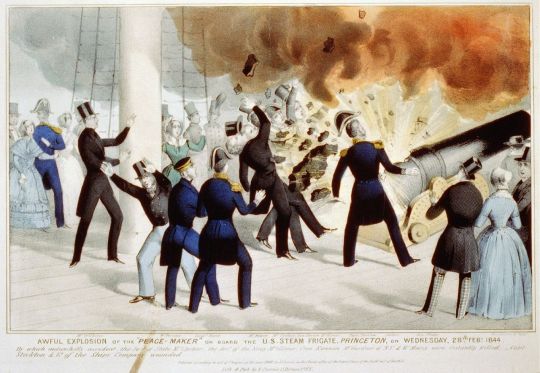
On February 28, 1844, Dolley Madison was far removed from her time as First Lady of the United States, but still held on to her spot as Washington's Greatest Hostess. She was the widow of a bona fide Founding Father, James Madison -- the 4th President of the United States and principal author of the U.S. Constitution and Bill of Rights -- but he had left the White House almost 27 years earlier and died in 1836. However, Dolley -- now 75 years old -- remained a darling of the Washington social scene. Though she often struggled financially, Dolley Madison continued entertaining guests in the nation's capital and helped organize social gatherings around the city, acting as a sort of guest hostess wherever she visited and whenever she was invited -- and she was invited everywhere. Now, as the first auguries of spring began their awakening in-and-around Washington, D.C., Dolley helped plan a cruise down the Potomac River on the newly-built USS Princeton -- a showcase vessel for the United States Navy which happened to be one of the most advanced warships of its time. Nearly 70 years after the Declaration of Independence, Dolley Madison was still the life of the party and an ideal person to help plan a celebration aboard the USS Princeton, just as she'd been doing throughout the entire life of the young American nation.
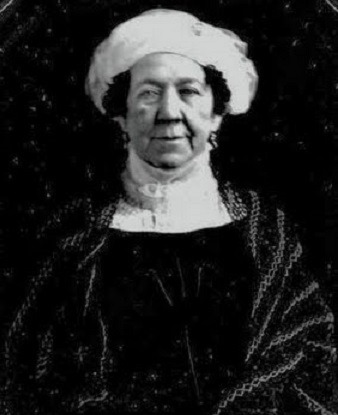
[Dolley Madison, daguerreotype by Mathew Brady in 1848, four years after the Princeton explosion.]
Launched just six months earlier, the Princeton was the U.S. Navy's first propeller-driven warship and its Captain, Robert Field Stockton, was proud of his charge. A cruise to demonstrate the ship's speed, capabilities, and weaponry to the Washington elite would be advantageous to the Navy's growth and to Captain Stockton's ambition. Besides Dolley Madison and the Princeton's crew of 178 sailors, the ship welcomed over 350 guests, including dignitaries such as Secretary of State Abel Upshur, Secretary of the Navy Thomas W. Gilmer, Secretary of War William Wilkins, Postmaster General Charles A. Wickliffe, Senator Thomas Hart Benton, and other diplomats and members of Congress. The most celebrated guest on the Princeton that day, however, was President John Tyler, who had also invited a young woman he had been romantically interested in, Julia Gardiner, and her father, David Gardiner, an influential New York lawyer and former State Senator.
Everyone on board the Princeton had underlying reasons for taking the cruise down the Potomac. For some, it was to see the Princeton for themselves. For others, it was because it was the place to be for politicians and diplomats on that February day. Some took the cruise for the opportunity to observe others, and some took the cruise in order to be noticed. The big draw, however, was a chance to see the Princeton's two large guns -- weapons so big and powerful that they were given their own names: the "Oregon" and the "Peacemaker" -- being fired. Both of the guns were impressive, but the "Peacemaker" was an amazing spectacle. At the time, it was the largest naval gun in the world. The ship was so new and the "Peacemaker" was so potentially devastating that, as of the day of the Princeton's cruise down the Potomac, the weapon had been fired no more than five times, according to Captain Stockton.
In February 1844, John Tyler was entering the final year of a contentious, controversial, and accidental Presidency. Elected as Vice President alongside William Henry Harrison in 1840, Tyler spent only a month in the Vice Presidency before President Harrison died in office. On April 4, 1841, Tyler became the 10th President of the United States, but his succession was not a smooth one. Harrison had been the first President to die in office and the Constitution was not specifically clear about Presidential succession. To many, including everyone in President Harrison's Cabinet, Tyler was still the Vice President and only assumed the duties of the Presidency, not the title or the privileges (such as living in the White House). At his first meeting with the men Harrison had appointed to the Cabinet, the Cabinet all but insisted that they would rule by committee and that Tyler had no more power or influence than, say the Postmaster General (which was a Cabinet-level position until 1971). Many Americans felt that Tyler was merely "Acting President," and that he was to defer to the will of the Cabinet on all issues.
Tyler vehemently disagreed and the manner in which he assumed office set a precedent that was followed by all future Vice Presidents and was eventually cemented into the Constitution. Tyler declared that he was not the Vice President or the "Acting President," but that Harrison's death had propelled him directly into the office of President of the United States to serve out the remainder of Harrison's elected term with the same powers and duties and privileges that come with the office. Tyler moved into the White House and, when his Cabinet balked at his assumption of power, he accepted the resignation of everyone but his Secretary of State, Daniel Webster (Webster eventually resigned in 1843).
President Tyler's troubles did not disappear once Harrison's hand-picked Cabinet departed or after Tyler settled into the Executive Mansion. The slavery question was tearing the nation further and further apart by the day. When Tyler won election in 1840 as Harrison's Vice President, he did so as a member of the Whig Party, but when it came down to Tyler's personal political ideology he was all over the political spectrum. As a younger man, he supported Thomas Jefferson and the Democratic-Republicans and he supported Andrew Jackson during Jackson's first term before Tyler became a Whig. Upon his Vice Presidential nomination, there were questions about Tyler's Whig credentials, but the Whigs needed a strong Southern balance on the ticket and accepted Tyler. But now that General Harrison was dead, President Tyler's independence frustrated his party, which felt that he was not sufficiently Whiggish. With former President Andrew Jackson out of the picture and retired in Nashville, and with Whigs in control of Congress and the White House, the party attempted to establish another Bank of the United States. The Whig Congress pushed through a bill creating a new Bank of the United States, but President Tyler definitively broke ranks with the party that had nominated him for national office and vetoed the bill. Twice. So, just months after assuming the Presidency, Tyler was expelled from the Whig Party and remained a President without a party until he left the White House in 1845.
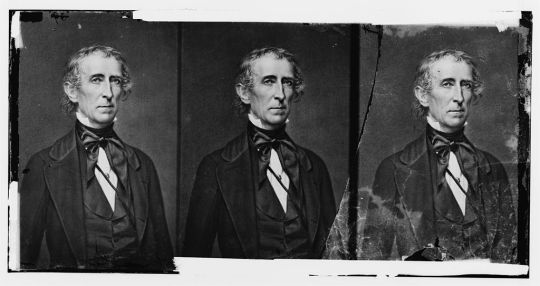
Now, on a warm day at the end of February 1844, Tyler was thinking about whether or not he would support the annexation of Texas. The President also thought of romance. In September 1842, Tyler's wife, Letitia, died in the White House after suffering a stroke. Tyler was still grieving when he began courting Julia Gardiner in January 1843. Tyler had met Julia while his wife was still alive, but he didn't become smitten with her until after his wife's death. Tyler and Julia kept their relationship guarded from the public and the President was even secretive about it to his (very large) family. Part of the reason for his reluctance to be open about his feelings was because Letitia had only been dead for a few months when he started dating Julia. However, a bigger reason was Julia's age. When they began dating, Julia Gardiner was just 22 years old. The 52-year-old President was wary about how his children (he and Letitia had seven children who lived to maturity) would feel about him dating a woman who was five years younger than his oldest daughter.
The age difference also worried Julia's family. Julia Gardiner was the daughter of David Gardiner, a wealthy New York lawyer and former New York State Senator. She was born in 1820 on an island in the Long Island Sound named after her family, and had everything that she wanted or needed while growing up on Gardiner's Island. Julia was beautiful and much in demand by the eligible bachelors of the East Coast. After meeting President Tyler, Julia first tried to reject his advances, but she was certainly intrigued by the powerful and charming Virginian. For his part, Tyler was madly in love with Julia and he first proposed to her in late-1843. Julia's mother did not approve of her daughter marrying a man 30 years older than Julia, so Tyler didn't get an answer. By inviting Julia and her father to accompany him on the USS Princeton, John Tyler hoped to show David Gardiner that he could impress the wealthy New Yorker and demonstrate that he could be a wonderful husband to Julia.
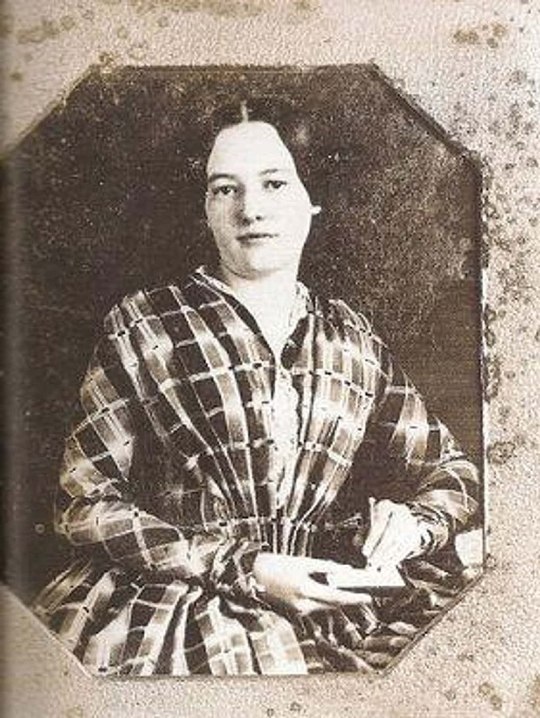
[Julia Gardiner Tyler, around the time of the Princeton explosion and her marriage to President Tyler, c. 1844]
••• Guests gathered at the Washington Navy Yard as ferries transported them across the Potomac River to Alexandria, Virginia, where the USS Princeton was anchored and ready for the afternoon cruise down the Potomac. As dignitaries boarded Captain Stockton's ship, they marveled at the size of the two guns on deck and examined every inch of the 164-foot warship. Music was provided by the United States Marine Band -- "The President's Own" -- and food was served below deck as the Princeton began its leisurely cruise down the Potomac. As guests explored the Princeton and watched the historic sites on both shores of the Potomac pass by, the massive "Peacemaker" gun was fired to the delight of everyone on the ship. The rounds fired by the powerful "Peacemaker" were capable of traveling up to three miles. As the warship cruised down the river the rounds that were fired were aimed at ice floes in the distance which were breaking apart as the afternoon sun warmed the Potomac. The cruise continued, with men mostly on the deck and pretty much all women below deck where food and drinks flowed freely, conversation was genial, and some of the guests were gleefully singing and clearly enjoying themselves.

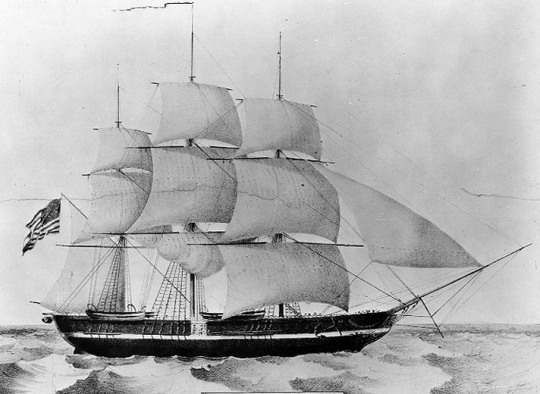
When the Princeton reached Mount Vernon and George Washington's sprawling estate came into view, the ship fired another round from the "Peacemaker" in tribute the first President and then turned around for the return trip to Washington, D.C. The Princeton's passengers had gathered below deck for celebratory toasts and to listen to the impromptu singing concert taking place in the salon. At around 4:00 PM, some of the men requested a chance to witness the "Peacemaker" being fired again, but Captain Stockton demurred, telling the men, "No more guns tonight." However, one of the men who wished to see the "Peacemaker" fired once again was Thomas W. Gilmer, the man who had become Secretary of the Navy just 10 days earlier -- a man who just happened to be Captain Stockton's superior. Gilmer's wish was something akin to an order to Captain Stockton, so Stockton headed to the deck and had the gun prepared to be fired once more.
Many of the men began heading upstairs to witness the firing of the "Peacemaker" while the women mostly remained below deck and continued with their songs and conversations. President Tyler was heading up the gangway plank towards the deck when he was told that his son-in-law, William Waller, the husband of his daughter Elizabeth, was about to sing one of Tyler's favorite songs. Instead of heading to the deck, the President headed back into the salon and was handed a drink. Upstairs, men crowded around the giant "Peacemaker" for one last demonstration of its firing power.
On the deck, Secretary of War William Wilkins jokingly told the spectators, "Though I am Secretary of War, I do not like this firing, and believe I shall run!" before moving to the far side of the Princeton. The remainder of the guests were close to the "Peacemaker" and the big gun was ready to be fired. The Princeton was about 15 miles downriver from Washington, D.C. and two sailors took the final steps for firing the weapon.
Suddenly, at 4:06 PM, a massive explosion rocked the Princeton and the deck was obscured by white smoke and an eerie silence. President Tyler rushed up to the deck to investigate what had happened, but what he found was a horrific scene. The "Peacemaker" -- the largest naval gun in the world -- had exploded at the breech. The powerful explosion tore part of the ship's deck and the "Peacemaker" broke into red-hot pieces of iron that flew into the crowd of spectators. Nobody downstairs was injured, but the deck of the Princeton was a place of horror. Eight people had been killed and 17 were seriously injured, including Captain Stockton and Senator Thomas Hart Benton. As President Tyler reached the deck, the silence turned to anguished screams and confusion.
The President fought through the smoke and found that the toll was high. Secretary of State Abel Upshur was dead -- literally disemboweled by the blast. Navy Secretary Gilmer was dead. The Princeton's Commander Beverly Kennon and two Princeton sailors were dead. American diplomat Virgil Maxcy was dead. President Tyler's slave, Armistead, who had requested and been granted permission from Tyler to view the gun as it was being fired was dead. And, finally, David Gardiner -- the father of the woman that the President hoped to marry -- was also killed by the blast, his arms and legs severed from his body by the force of the explosion. A tearful President was devastated by the loss of two of his senior Cabinet members, and he headed back down below deck to notify the women about what had happened. With dozens of victims and witnesses screaming, crying, and/or in shock throughout the ship, there was an attempt to keep most of the passengers below so that they didn't see the gruesome scene on the deck.
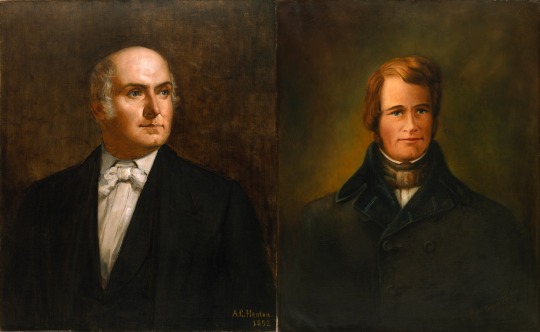
[Secretary of State Abel Upshur and Secretary of the Navy Thomas W. Gilmer, who were both killed by the explosion on Feb. 28, 1844.]
The smoke-filled deck of the Princeton was covered with blood, dismembered limbs, dead bodies, and stunned survivors, many of whom had been wounded by pieces of red-hot, iron shrapnel from the gun or pieces of human beings torn apart by the explosion. Throughout the ship, ears were ringing and people were rendered temporarily deaf by the sound of the blast. Below decks, the women who had accompanied the Princeton awaited more news from above, which quickly trickled downstairs. Someone yelled, "The Secretary of State is dead!" and the news did not improve. When Julia Gardiner found out that her father was among those who had been killed in the blast, she fainted -- directly into the arms of President Tyler. Dolley Madison, who had seen much in her 75 years -- during the War of 1812, she barely escaped the White House shortly before British forces captured Washington and burned the Capitol and the Presidential Mansion -- was certainly stunned by the tragedy aboard the ship, but she quickly did her best to comfort the Princeton's passengers who were shaken and distressed.
As the USS Princeton limped back to Washington, D.C., John Tyler comforted Julia Gardiner as best as he could. For the President, his pleasure cruise with the woman he hoped to marry and her wealthy father could not have gone worse. Now, David Gardiner was literally laying in pieces on the deck of the Princeton as Tyler -- who was also returning to Washington without a Secretary of State or Secretary of the Navy -- tried to console Gardiner's young daughter, but she remained unconscious until the ship arrived back in Alexandria, Virginia.
When the Princeton arrived at Alexandria, President Tyler physically carried Julia Gardiner from the wounded warship. On the gangplank, Julia finally awakened in the President's arms, and as she later said, "I struggled so that I almost knocked both of us off the gangplank. I did not know at the time, but I learned later it was the President whose life I almost consigned to the water." President Tyler had Julia taken directly to the White House where she spent the next few days recuperating under the watchful eyes of the President and his large family.
The bodies of Julia's father, the two dead Cabinet members (Secretaries Upshur and Gilmer), the Princeton's Commander Kennon, and the diplomat Maxcy remained on board the Princeton on the night of February 28th. The injured went to hospitals and homes around the capital city. The next day, Washington was in official mourning as the word of the tragedy spread and the signs of mourning -- black crepe hanging on the White House and other public buildings --were displayed. As Washington mourned, the bodies of Gardiner, Upshur, Gilmer, Kennon, and Maxcy were transported to the White House, where their flag-draped caskets rested in honor in the East Room. (It's safe to assume that President Tyler's slave wasn't awarded the same honors -- when the bodies were removed from the Princeton, they were all placed in magnificent mahogany caskets, except for Armistead, who was placed in one made from cherry. The President did reportedly give Armistead's mother $200.)
After two days of lying in state in the East Room of the White House, Gardiner, Upshur, Gilmer, and Kennon were transferred to St. John's Episcopal Church, where all of official Washington showed up to pay their respects at their joint funeral (Maxcy's family took his remains for a private funeral and burial shortly after his body arrived at the Executive Mansion). It was a solemn occasion -- one of the biggest tragedies to strike the United States up to that point, and a significant loss to President Tyler, both professionally and personally. Tyler was mourning two important members of his Cabinet, and the woman he hoped to marry was burying her father after he had been killed in the most gruesome manner imaginable on a cruise that Tyler had invited him to take.
The funeral started with an ominous and unfortunate signal: the firing of loud artillery across from the Executive Mansion could not have been a pleasant reminder to those who had survived the tragedy on board the Princeton a few days earlier. The bodies of Upshur, Gilmer, Kennon, and Gardiner were taken to Congressional Cemetery following the funeral and buried there, although Gardiner was later exhumed and reburied on Gardiner's Island in New York. After narrowly escaping death or serious injury on the Princeton a few days earlier, President Tyler found himself in danger once again as he left the funeral. Traveling through the busy streets of Washington in his horse-drawn carriage, the President's horses were startled by the crowds and bolted -- leaving Tyler helpless in a runaway carriage until a man bravely rushed out from a hotel entrance and helped stop the carriage.
••• Being comforted by President Tyler and his immediate family in the aftermath of her father's death changed Julia Gardiner's mind about marrying the much older President. Tyler had done everything possible to console her and make her feel safe in the days after the Princeton explosion. Later, Julia would write that, "After I lost my father, I felt differently towards the President. He seemed to fill the place and to be more agreeable in every way than any younger man was or could be." While the loss of her father was certainly tragic, John Tyler happened to be in the right place at the right time, and, in a strange way, David Gardiner's death may have helped spark the romance between the President and Gardiner's daughter. Several weeks after the Princeton tragedy, Tyler asked Julia's mother (who herself was nearly a decade younger than the President!) for her blessing to marry Julia and Mrs. Gardiner approved of the union.
Still, the marriage was not without controversy. The wedding took place on June 26, 1844, just a few months after the Princeton explosion. Julia and her family were still in mourning for Mr. Gardiner, so the wedding was solemn and low-key. Plus, the President's family -- particularly his daughters from his first marriage -- were reluctant to accept his new bride. After all, Tyler's first wife had died less than two years earlier, and Julia Gardiner was about the same age as Tyler's daughters; in fact, she was five years younger than Tyler's oldest daughter. One more unique aspect of the wedding was that this was the first time an incumbent President of the United States had ever gotten married while in office. Normally, it would be blockbuster social news, but the President's wedding was kept strictly private.
Accompanied only by his son, John Tyler III, the President and Julia Gardiner were married at the Church of the Ascension in Manhattan (which is still standing today, at Fifth Avenue and Tenth Street in Greenwich Village) on June 26, 1844. Very few people even knew that the President was in town until after the wedding when they heard the salute from the guns of warships in New York Harbor as he and his new First Lady departed the city (again, maybe firing the guns wasn't the greatest idea for this particular couple at that particular time?). According to one of the only eyewitness accounts of the wedding, published in The New York Morning Express the day after the nuptials, the bride was given away by her brother and and "robed simply in white, with a gauze veil depending from a circlet of white flowers wreathed in her hair." After the ceremony, the wedding party held a dinner at Lafayette Place before the President and Mrs. Tyler departed the city by steamer, staying the night in Philadelphia, before proceeding back to Washington on a special train the next day.

[The Church of the Ascension in Manhattan where President Tyler and Julia Gardiner were married on June 26, 1844.]
When President Tyler left office in 1845, he and his wife retired to Tyler's plantation in Virginia, Sherwood Forest. They had seven children (in addition to the seven surviving children from Tyler's first marriage) and remained happily married, despite the 30-year age difference between the husband and wife. In January 1862, the Tylers headed to Richmond for Tyler's inauguration as a member of the Confederate House of Representatives. Tyler was the only former President who did not remain loyal to the Union during the Civil War. On January 18th, the 71-year-old Tyler died in Richmond's Exchange Hotel, likely due to complications from a stroke and was buried in Richmond's Hollywood Cemetery with Confederate honors. Widely considered a traitor in the North, official notice of Tyler's death wasn't given until 1915 when Congress finally erected a monument near his grave.
Julia Gardiner Tyler lived until 1889, but remarkably, as of 2024, one of President and Mrs. Tyler's grandsons is still living. With seven children (the last of which died in 1947 -- 157 years after John Tyler's birth!), the Tylers were blessed with a wealth of grandchildren and Harrison Ruffin Tyler (born in 1928) is still alive today (his brother, Lyon Gardiner Tyler Jr., died in 2020). In the 1970s, Harrison Tyler purchased and restored his grandfather's beloved Virginia plantation, Sherwood Forest, and often spoke about his family's unique place in history until his health started to fail in recent years.
••• As for the USS Princeton, well, it never truly recovered from the "Peacemaker" explosion. Captain Robert Field Stockton was absolved of blame for the tragedy and went on to fame in California during the Mexican-American War (he has a city named after him near Sacramento), and later was elected a United States Senator from New Jersey. The Princeton participated in engagements in the Gulf of Mexico during the Mexican-American War, but its hull was found to be rotting after the war ended. It was broken up for scrap in Boston and the "Peacemaker's" twin gun -- the "Oregon" -- can be seen today on the grounds of the United States Naval Academy in Annapolis, Maryland.
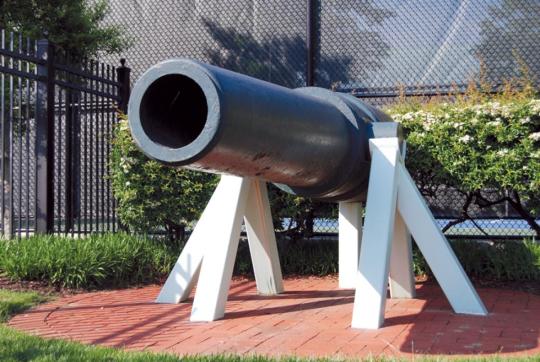
[The "Oregon" gun from the USS Princeton, now on display at the United States Naval Academy in Annapolis, Maryland.]
During World War II, a new USS Princeton was commissioned. A 622-foot-long aircraft carrier, the new Princeton engaged in action in the Pacific Ocean. On October 20, 1944 -- 100 years after the explosion of the "Peacemaker" during President Tyler's Potomac River cruise -- the modern Princeton was attacked by a Japanese dive bomber in the Leyte Gulf and 108 sailors were killed. Even the Princeton's descendants seem to be cursed.

#History#USS Princeton#USS Princeton Explosion#John Tyler#President Tyler#Tyler Administration#Julia Gardiner Tyler#David Gardiner#First Ladies#First Families#Presidential Marriages#Presidential Relationships#Robert Field Stockton#Abel Upshur#Politics#Political History#Military History#WWII#Dolley Madison#Thomas W. Gilmer#Tyler Family#Cabinet of John Tyler#Tyler Cabinet#Presidential History#Presidential Politics#Princeton Explosion#1844 Explosion of the Princeton#U.S. Navy#Naval Accidents#U.S. Naval History
22 notes
·
View notes
Text
I have had a horrible HP OC idea :DD
So the premise is a 6th year Ravenclaw, Elizabeth Clarke, student who's father, Dorian Clarke, works for MI6. It is the beginning of Harry Potters 4th year.
Now stay with me here because; Dorian works for MI6 he already knows about magic, because the Muggle/Magical government sometimes have to work together.
This is technically multifandom but you don't have to know anything about anything other than harry potter
Under the cut is a lot of info I have literally been thinking about this for 6 months. I have issues ;.;
So I headcannon that around the world, lots of other places are much more lax with the statute of secrecy. So when Dorian went and fought in Vietnam he was very violently introduced to magic, on his side and on the side of the Viet Cong.
So when his daughter is born and has magic, he goes to one of his magical coworkers and asks for advice. This coworker just so happens to be Kingsley Shackbolt. So he learns a whole lot about the magical world and gets an insight into magical politics. He also enlists Kingsley to help her with her magic and anything else Eliza may need.
When she was born, her mum, Marie, died in childbirth. This meant Dorian had to take a step back from the field and care for her. But when she is five, he meets her ma'.
Her ma, Nora, is a strong independent Irishwoman who was stuck in an abusive relationship with an armsdealer. In exchange for his death, she informed on him to the government, and that is where Nora and Dorian meet. He was her government contact. When her husband died, and she got a new identity, they kept in contact and fell in love.
She took to Elizabeth like she was her own daughter. The pair married when Elizabeth was eight, two years later. They had twins who are Elizabeth's half siblings, Sloane and William. They were born a year after the marriage when Elizabeth was nine.
During this time, Dorian has become renowned throughout the magical and muggle espionage worlds for his work.
Some of Elizabeths honorary multifandom family include; Alastor Moody (Grandpa Ally), Kingsley Shackbolt (Uncle King), Amelia Bones (Auntie Amy), Henrietta Lange (Granny Hetty), Napoleon Solo (Uncle Leon), Illiya Kuryakin (Uncle Iliusha), Gabby Teller (Auntie Gabby), Harry Hart (Uncle Gal), Hamish Mycroft (Uncle Merlin), James Bond (Uncle Spy), Russell Adler (Uncle Russ), Helen Park (Aunt Helen)
Now onto the actual plot :DD
It starts in book 4 at the quidditch game. I would like it to be from Harry's perspective when he makes it to the top booth and sees the British Minister chatting with the Bulgarian Minister. So she comes into the booth wearing a Princess Diana esque outfit and the Bulgarian Minister is so happy to see her and starts chatting to her in Bulgarian.
Harry can't tell what she's saying but it's clear from her tone of voice she is making fun of the British Minister. No one picks up on this but him. She then introduces herself, and when Malfoy Sr. asks how she knows the Bulgarian Minister she tells him that it's classified lol. The Bulgarian Minister looses his shit with laughter.
(can you tell i dont remember these mens names lol)
Then the games begin and go how they went in cannon. At the end, the Bulgarian Minister convinces Elizabeth to come with him and meet the Bulgarian team.
Then when the Death Eaters attack and everyone runs into the forest they see her, perched in one of the trees with a HK33 assault rifle aimed at the Death Eaters. She is ready to obliterate them if they get too close.
Since she is still a minor, she is not yet allowed to use magic, so she has to make do with one of the guns her father/family taught her to shoot.
When the Death Eaters vanish and the Ministry Officials get there, she is still holding her gun. This is when the POV switches to her and her thought process is something along the lines of her hoping they don't ask to look into her bag so she doesn't have to show them the small arsenal her family gave her.
(Guns in her arsenal 1, 2, 3, 4, 5, 6, 7)
She defends the trio and tells the ministry to talk to her lawyer, and tells them to fuck off. Then she goes home and promptly tells her father everything. Mysteriously, she is not contacted by the ministry again.
When she goes back to Hogwarts, she already knows about the TriWizzard Tournament. So she isn't shocked. Since her birthday was September 29, 1978 she could put her name in, but she is uninterested.
So when her name is called as the Hogwarts official champion, she is understandably pissed off. Still she goes back with the other champions, and decides to wait for the officials before reaming them out. When Harry Potter comes back and says he is a champion though, she really looses her shit.
Not at him though, at the adults. She starts raging and cursing and demanding to see the rule book. When she does confirm both her and Harry have to compete, she demands to keep a copy of the rule book. She promises Harry all the help she can give him, which prompts the other champions to do the same.
When she gets back to Ravenclaw tower, she stands on a table in the center of the room and makes an announcement. She tells her housemates that she is outsourcing the work of this tournament.
There will be a prize for anyone who can tell her, with proof, who put her name in the goblet, and who can tell her what the challenge is, and the best way to beat the challenge. She may not want this, but she will make the organizers regret not taking her out.
Flitwick gives her a look and she adds that if their schoolwork slips between now and them giving her the advice they would not be getting the prize. Then she goes to bed.
For the next few weeks she is getting intel about the first task, and filters the important bits to Harry and Harmione.
She also takes this time to snag Moody's flask. She's been around him since she was 6, she knew how he acts. And he never drinks around children. So she steals the flask and asks Snape to test it. When he does he finds out it is Polyjuice Potion.
Instantly she goes to the fire and calles Auntie Amy, who assembles some Aurors to go to Hogwarts. Elizabeth leads them to 'Moody's' classroom and they restrain him and find out who he is. After some (lightish) interrogation, BC Jr. gives up the location of Moody. Once he does, she gets him out.
Moody is proud of her, telling her, "I knew you would figure it out." before passing out. He is sent to St. Mungo's for treatment. Because he wasn't held long, he was able to come back and teach within the week.
It is classified, and no one knows about the switch. They just think that Moody got nicer and stopped drinking.
When Rita tries her BS she tells the cockroach "No comment, and if you put anything else in that paper about me I will sue you until you can't even get a job in Knockturn." and Harry follows suit because he knows a good idea when he sees one.
Eliza makes some pointed comments about "A grown woman wanting to go into a broom closet with a little boy isn't a good look now, is it?" and Rita completely backs off.
So on the day of the trial, she is prepared. When Harry draws the hardest dragon, she forces him to switch with her because he is a literal child. Then she goes out there and gets the egg.
When she gets back to the common room she outsources the second trial again with a similar speech.
When she completes the second task, she is furious because they took her muggle ma from her. She nearly kills Dumbledore for allowing this. Thankfully, her ma talks her down, and states that they can just sue instead when this was all over.
Everyone sweatdrops like they're in an anime.
When she learns she has to dance at the ball she is annoyed. When Harry says he has no one to go with, she offers to go with him as friends. They agree and have a good time.
When she finally gets to the maze, she is armed to the teeth. She summons her extendable bag from her dad, who is in the audience. It is filled with enough ammunitions to supply a small army. Once she slaughters her way to the cup, Harry makes it at the same time.
They both agree to grab it, and get transported to the graveyard. Voldemort orders her dead, but when the Killing Curse is shot at her, it only knocks her back. Her fathers old identity disks stopped it. She lays there stunned, waiting for the perfect moment to get up and kill the bastard, take Harry, and run.
Unfortunatly, Moldymort manages to finish the ritual before she gets up. Then he summons the Death Eaters, and she really has to pretend to be dead. Him and Harry duel, and while everyone is distracted, she slowly inches her way towards the Cup.
When she is in position, she lays down covering fire with one of her guns, hitting Death Eaters, and getting Voldemort in the heart. As the Death Eaters return fire and Harry runs towards her, she watches Voldemort stand back up, unhindered by her bullet. The same can not be said for the other Death Eaters who she has shot.
They grab the Cup and are whisked back to the Tournament. She still has her gun out, and doesn't let anyone approach until her dad comes and talks her down. When she tells him about Voldy, he gets quiet and murderous, before turning to Moody, who turns to Dumbledore.
Eliza, her family, and Harry, as well as Snape are ushered into Dumbledores office. When they demand to know why Voldy didn't die, Dumbles talks them in circles. When Eliza gets sick of it and starts shouting, he tells the truth about Horcruxes. Everyone is pissed.
Eliza then tells Harry that he would be staying with her and her family over the break, and he readily accepts. Dumbledore questions Harry's safety, but then Dorian lays out the nonmagical defenses he has set up at their mansion, and Moody chimes in with the magical defenses he set up. Safe to say, the questions about safety are unwarranted after their brief explanation.
Then she goes through the rest of the year like normal, never finding out who put her name in the Goblet of Fire. When she gets off the train, she and Harry walk to her family. There they are greeted with hugs.
Bonuses:
On easter break she goes home and we get to see her interact with her terrifying uncles/aunts/grandparents. Even better if Harry/Ron/Harmione join in and are slightly horrified by how dangerous these people are lol
Eliza and her non-mgaical family play capture the flag but they use real tactics and gear with their paint guns. No magic and it kinda terrifies the magical people.
Napoleon has a bank vault in Gringotts for all his stolen things
Napoleon, Illiya, Hetty, and Harry (Hart) helped her pick out her Yule gown. Her parents are there of course, but they don't have the same passion for fashion that these spies have. They mostly sit there and give confused but supportive thumbs ups.
Merlin and Bond keep giving her new tech to try out at school to see how it interacts with magic.
Gabby and Sloane work on cars together.
Hetty, Nora, Helen, Gabby, and Amelia form a terrifying relationship that scares all men. Eliza and Sloane don't get what's so terrifying about them, and are slowly being indoctrinated by the scary women.
When the DA is made, Eliza finds them in the bar and scolds them for shitty spycraft, before pointing out the man listening in on them. She quickly moves them elsewhere, and becomes one of its core teachers. She teaches weapons, self defense, and espionage.
When they go and storm the Ministry Eliza kills Bellatrix before she can hurt Sirius because she used one of her guns.
When she met the Order of the Phoenix she was completely unimpressed with how they were running things, and taught them how to run a better resistance group. When they tried to shit on her for this, she tells them that her dad literally did this for a living for many years and she knows what she's talking about. She is also unimpressed that they only have one spy.
Eliza in her 7th year steals blood quills and sends them to her parents as proof of the abuse. It is halfway through the year when this happens. She got a detention for snoging George Weasley. Then she does international interviews about how the British Ministry is allowing this to happen, and circumventing Dumbledore. Umbridge is quickly fired. A revolving door of Aurors start teaching DADA.
Eliza roundhose kicks someone in the head and then John Cena elbow drops onto them in her second year because they called her a mudblood. She gets lots of detention but that was the last time anyone tried that, so she saw it as a win. So did her family. After all, in Hetty's wise words to her afterwards, "You can't negotiate with fascist bigots, dear. Better to just kill them instead."
She prefers riding horses to riding brooms (riding a thestral was the highlight of her year) and her ma owns a farm where they ride together because they are the only ones who really enjoy it. (The others will join if Nora asks, but only then).
She is Flitwick's favorite student. He tried to convince her to become a Prefect but she just laughed and told him she would switch schools if he tried to do that to her. (She was not joking and he knew it).
Maybe, her mum was not who she seemed to be, and knew more about magic than she let on...
Anyway I'm all done for now and congrats if you read through all'at
Will probably add to this if I have anymore ideas
#harry potter fanfiction#harry potter oc#crossover fanfiction#ravenclaw oc#ravenclaw#harry potter#Henrietta lange#ncis la#black ops cold war#russell adler#helen park#harry hart#kingsman#merlin kingsman#tmfu movie#illya kuryakin#gaby teller#napoleon solo#alastor moody#kingsley shacklebolt#amelia bones#i think thats all#harry potter and the goblet of fire
8 notes
·
View notes
Note
The kids are NOT alright
https://www.npr.org/2024/06/16/nx-s1-5003933/young-voters-conservative-trump-turning-point
Sporting a "Pretty Girls Vote Republican" baseball cap and several buttons, including one reading "Gun Rights are Women's Rights," Lauren Kerby was surprised to be asked who she plans to vote for in the fall.
"Obviously Trump," the 21-year-old from Berkeley, Mich., said with a laugh. "I came here for a reason."
Here is the 'People’s Convention,' run by Turning Point Action, the advocacy wing of Turning Point USA, one of the largest national organizations focused on engaging students on conservative issues.
Turning Point - which rose out of concerns about free speech on college campuses, has grown into an unapologetically pro-Trump machine, focused on organizing for the former president ahead of the 2024 election.
It hosts events like these, attracting voters like Kerby and hundreds of others like her who want to party, young conservative style.
And this is certainly a Trump show. At the Huntington Place Convention Center in downtown Detroit, a bejeweled presidential seal with Trump’s face in the center rests on the hood of a gold-painted Mercedes-Benz. At a nearby booth among dozens, vendors are selling "America First" cowboy hats and shirts reading, "Voting Convicted Felon, 2024."
The festivities this year come as Turning Point Action works to significantly expand its organizing presence in key swing states ahead of the general election, including Michigan, home to this year’s conference.
Just five months out, enthusiasm for Trump is high among younger attendees. NPR spoke with more than a dozen voters under 30 who remain committed to Trump, motivated to vote for him largely because of his isolationist ideas and focus on the economy and immigration.
Their unwavering support stands in contrast to the sentiment of many younger Democratic voters, who remain unsure or unenthused about backing President Biden again.
Trump took the stage Saturday night as the event headliner. He ticked through his proposed second-term agenda and criticized Biden’s record, making little mention of the youth-focused nature of the event, outside of publicly thanking Turning Point founder and longtime supporter, Charlie Kirk, who is a millennial.
“[Kirk’s] got his army of young people,” Trump said to a crowd of over 8,000, according to Kirk. Though Turning Point staff told NPR that around 3,000 of the attendees were students.
“These are young patriots. They don’t want to see… what's been happening in our country," Trump added.
The former president’s remarks came after two days of speeches from conservative firebrands and high-profile Trump allies, including Republican National Committee co-chair and Trump’s daughter-in-law Lara Trump, former presidential candidate Vivek Ramaswamy, Rep. Matt Gaetz (R-Fla.) and Rep. Marjorie Taylor Greene (R-Ga.)
This year’s conference also comes just over two weeks after a New York jury found Trump guilty of criminal charges, a decision that could negatively impact his chances with younger voters. The latest Harvard youth poll, published in March, found a potential guilty verdict increased Biden’s lead by 10 percentage points among young Americans overall.
Much like their unwavering support in the election, though, voters at the event are unphased by his conviction. His mugshot is displayed on the posters and t-shirts of attendees.
To 20-year-old activist James Hart of Tallahassee, Fla., the verdict has little effect.
“I don’t really think, at this point, anyone’s feelings changed. I think everyone knows who they’re going to vote for. We know Trump. Trust me – we know Joe Biden,” said Hart. “We know their policy. We know how they're going to act. And I trust Trump.”
Where young conservatives stand
For Kerby from Berkeley, Mich., supporting Trump partially stems from his push for isolationism, including limiting U.S. aid to Ukraine in its war with Russia.
“He’s focused on what’s happening here,” she said, pointing instead to Trump’s focus on reducing illegal immigration.
“Not saying that other places don't matter, but we should matter first,” Kerby’s friend, Elaina Luca, 21, added. “When you're in a family, you make sure that your family is okay first.”
Luca is also backing Trump. As a mom with two young kids, she’s most concerned about rising prices.
“When I drive around and see a nice house, I like to look up how much it's sold for,” she explained. “In today's economy, it's like, ‘Oh, wow, how did these people even afford that? …And it's like, ‘Oh no, they bought it in 2012 for like $150,000 and now it's worth like $1 million.”
“How am I supposed to get a house to raise my children to live in?” she wondered aloud, “I don't want to pay for a house for the rest of my life.”
Turning Point’s 2024 strategy
While Turning Point’s non-profit side has held student conferences for nearly a decade, also sprinkled with appearances from Republican politicians and conservative media figures, this conference marks just the second for Turning Point Action.
The activist network has morphed into a more pronounced political force, planning to ramp up its organizing ground game ahead of the election.
“It's night and day,” said Turning Point Action spokesman Andrew Kolvet. “Any activities we did, in 2022 for example, in the midterms, was like the Stone Age compared to the level of sophistication and just the resources that we’ve poured into this project to develop it.”
Kolvet is talking about the group’s “Chase the Vote” initiative, a get-out-to-vote campaign focused on reaching low-propensity voters in swing states that launched earlier this spring. Trump recently endorsed the program during a separate Turning Point event in Arizona, another pivotal state in 2024.
Turning Point hopes to raise $100 million to build up on the ground organizing staff and plans to work with the Trump campaign on canvassing – a notable change from past election cycles following new guidance from the Federal Election Commission.
Despite the roots of Turning Point, the program is not solely focused on young voters, though Kolvet said that will always be tied to Turning Point’s work.
Growing up under Trump, now it’s time to vote
Despite enthusiasm for Trump at Turning Point, Republicans face a steep challenge to bringing in more young voters. Voters under 30 have traditionally voted for Democrats, and in 2020, Biden won the age group by a 24-point margin.
Plus – young voters tend to be aligned with Democrats on their key issues – notably on abortion access, addressing climate and curbing gun violence. And despite struggling in polling, Biden still maintains a lead with young voters overall in multiple youth polls.
But among some young conservatives, albeit a proportionally smaller group, Trump’s style of Republican politics – once fringe and now mainstream – is overwhelmingly what they want for their political future.
“The pro-Trump, MAGA element definitely appeals more towards young conservatives and young Americans in general,” said 19-year-old Ohio student, Gabe Guidarini, a member of the College Republicans of America. “It actually addresses the problems that they face.”
He argued young people have trouble connecting to “old school Republican rhetoric” focused on cutting taxes and government spending, because they are not able to progress financially. And given the time period Gen Z has grown up during, Trump’s deviation from political norms is appealing, he explained.
James Hart agrees. Though the 20-year-old now lives in Tallahassee, he grew up in Detroit. “I was raised Democrat,” he said.
That is, until 2016, when his family flipped for Trump.
“His personality is what got my family to say. ‘Hey, you know, maybe the Democrats aren't the greatest,’” he said. “Honesty is the best policy. And up here in the Midwest, we're honest. We say it like it is. And Trump did that.”
Now, as Hart gets ready to vote for the first time, his mind is made up.
“I think most young people are going after Trump-like candidates,” he said. “We want the fire. We want the passion. We're tired of the same old, same old. We want bold policy that actually is going to lead with results.”

16 notes
·
View notes
Text
Because both RLM and James and Maso did videos this week about RoboCop 2 (because someone is doing a new show about him or something? I don't care), I realized I had never actually seen any of the sequels. But they're free on Tubi (and perhaps elsewhere), so I watched RoboCop 2.
I had always heard all the sequels were crap. And compared to the first one, which is decidedly too good for what it is, I can see why people say that. But I thought RoboCop 2 was pretty good.

It is certainly a retread of the first one, made with less love and nuance and attention to detail than the first one, by people who were literally just doing it because they were hired last-minute to do it. But it has a lot of good stuff in it, and its problems are minor.
I like the weird Dragnet-esque score. I like Willard Pugh as the over-confident, frantic buffoon mayor, who takes what is a kind of pointless subplot and makes it compelling. I like John Doolittle's Dr. Schenk, who it at 11 and about to pop the entire movie. I like the wacky comedy RoboCop 2 attempts who scream and then commit suicide. I like how the one they actually go with is a drug-fueled Metal Gear that acts like a poorly-trained attack dog and has a Lawnmower Man TV face for no good reason.

I like how his internal heads-up display is a MacOS UI, as compared to RoboCop's green phosphorus RoboDOS (because this certainly was 1990). Oh and the Phil Tippett stop-motion work is the best that ever got here, which is great. I almost forgot I was watching dolls fight in front of a green screen. Masterfully produced. The puppet they use for RoboCop after he is ripped apart is really good, too.
The attempts at satirical advertisements like in the first one are weak, and they probably shouldn't have bothered. OCP is so cartoonishly evil in this one (complete with a Nazi-esqe flag) that it beggars belief that no one really seems to care, especially after their incompetence gets like 40 cops massacred, in front of tons of TV cameras. Nancy Allen and Felton Perry, who were so good in the first one, are basically given nothing to do here. Even RoboCop himself seems to disappear for a third of the movie to make way for some "crime does not pay" child drug lord parable that is too goofy to mean anything. They also set up a character arc for Murphy where he is wresting with who he is by way of his lingering attachment to his ex-wife, but then that just...stops.
Instead, there is a sequence where OCP turns him into WOKEboCop, where they program him to talk to kids about good nutrition instead of gunning down poor people by the hundreds! And the kids make fun of him! Take THAT, Gary Hart!
...Yeah, I'm not giving that any more thought than the people who put it in the movie didn't in 1990. It makes no sense as a metaphor for anything in this plot as it is, and is literally just a thing that happens to RoboCop that he fixes by electrocuting himself. The only message this movie seems to have is maybe "hey, evil corporations and corrupt governments and drug gangs are all the same, man," and slow down with that mind-blowing revelation, 17 year old smoking pot for the first time!
Plus what is the proposed solution to this? Letting a cyborg police man shoot absolutely everyone? RoboCop is more the victim here than the hero. That's sort of the point.
I still liked it. It is more Peter Weller as RoboCop doing RoboCop stuff, and that's what it set out to be. Solid B.
Not sure I am looking forward to the next one, where it isn't Peter Weller and it apparently turns into a kids' movie where RoboCop gets a rocket pack accessory. Weird that RoboCop 2, where a child drug lord dies under a mountain of cash while holding RoboCop's hand, is the sequel that showed restraint.

(Edit: I watched the two linked videos after I wrote this. Of course we all have similar observations so it looks like I just stole talking points from videos that came out last week. I thought for sure I'd be the only one to mention the MacOS thing...dammit, Colin.
On the plus side I am exactly as observant as YouTube talking heads of a similar age and cultural background. WHAT ARE THE CHANCES?!)
1 note
·
View note
Text
505
summary: love can only last so long for two highly trained assassins
pairing: assassin!bucky x assassin!reader
word count: 6k
warnings: mentions of reading being "physically fit" due to training but no other body description, use of hard drugs/overdose, described murder, weapons, mentions of torture (this does get mildly graphic but not like... gory idk), smut (MINORS DNI), use of fake names, a lot of reader's background comes from the show scandal
a/n: i know the warnings make this sound super hardcore but it's really not terrible, but do heed them if you're sensitive to anything mentioned (and if you have any specific questions feel free to message me about it!!). i actually really enjoyed writing this even though it took me about two weeks of going back and forth. also loosely inspired by 505 by the arctic monkeys. always thankful for @pellucid-constellations who tells me whenever my writing is shit xoxo

505. Exactly where you needed to be. In less than 30 seconds, you had the lock picked and stepped silently into the room. It was a pretty typical target: son of a politician, kept entertained by money, drugs, and women. From the drug you had slipped into his drink at the bar downstairs, you suspected he should already be sedated in the room. However, you didn’t expect to see him already tied up, body slumped over in a chair. Just as quickly as you realized, you had your gun pulled from your thigh holster, pointed at the figure across the room.
With your guns trained on one another, he stepped out of the shadows. Another thing you hadn’t been prepared for: your unexpected guest was also the most beautiful man you had ever seen. You both slowly circled the room, sizing each other up.
“Who the hell are you?” Your voice was strong and commanding, and obviously seemed to have taken him aback. A small surge of pride was over you as his composure cracked, for a brief second, before hardening back to his impassive expression.
“Who the hell are you?” The nerve of this man, as if you would tell him. Well, the shoe’s on the other foot and all that. The most important question here was why. Why did he have your target tied up? Why was another organization able to get their hands on your intel? Why hadn’t you made a move yet?
At this point, you weren’t entirely interested in digging for information you likely wouldn’t get from this man, or the one on the chair. You just wanted to take out the mark and get back to your own hotel. You could see your feelings mirrored in your competitor, and decided you might as well press your luck.
“Let’s make a deal. I won’t kill you, you won’t kill me, and we can both kill this target. Whatever information you're looking for I’ll be able to keep to myself and then we can both be on our merry way. I’m not in the mood for a fight tonight, and you’re way too pretty for what I would do to you.”
This time, he couldn't mask the surprise on his face, or the quirk of his mouth as he contemplated your offer. Finally, he nodded, gesturing at your gun to call a truce. You both lowered your weapons before taking a few steps to meet in the middle of the room.
“James Grant, pleasure to meet you.” He let out a small huff of laughter at your narrowed eyes, holding his hand out for you to take. “I’d like to at least know what to call the beautiful woman I’ll be working with.”
Reaching to give him a dainty handshake you answered, “Elizabeth Hart. Though that’s not what my friends call me.” If you were never going to see this guy again, might as well have a little fun right?
“Oh, is that right? And when do I get the pleasure of being considered your friend?” Wanting to match his demeanor, you informed him that after this was finished you might give him a little more. At this point, you were practically nose to nose, his breath hot on your cheek. Just as he made the tilt of his head towards your mouth, you stepped back.
“Oh James, I know you're smarter than that. Let’s get a move on here. What was your plan? He’s too young for potassium chloride, they’d never believe a heart attack - I personally have some coke laced with fentanyl. Figured with a 21 year old playboy who frequents parties just like tonight’s, it’d be automatically ruled an overdose. Thoughts?”
(Bucky's thoughts were that he might already be in love, not that he would ever tell another soul that bit of information, least of all her.)
“I figured pills, but I like your idea better.” He immediately wanted to wipe the smug look off your face. “Don’t get too flattered, sweetheart, I really-” He was cut off by the groan of… what was his name again? John or Josh or something of the like. Though you had just been talking about the details of his death, you nearly forgot he was even there.
“Good morning, sleepyhead. It’s time we all have a little chat.” You had mastered the sickly sweet and condescending tone, it just made it all the more fun. He started begging to be released, bribing you with money, the typical responses you usually got. Instead of listening to his pleas, you and James started a fun little game. One of you would ask a question, he would refuse to answer, the other would force a line up his nose, then discuss your favorite techniques, weapons, etc. until he finally gave in. Once he started babbling and dribbling vomit, you set your stage. While James unreleased him from the satin restraints (perfect if you didn’t want to leave any obvious marks), you set up some lines of coke, adding the finishing touch of a streak right under his nose. Looking up from your handiwork, James had an expression akin to awe on his face.
“As much as I adore that look you’re giving me, I think it might be time to get out of here.” You fully expected to get out of this hotel and part ways, and never see each other again; but apparently James had other plans. The second the elevator doors closed, he had you pushed against the wall, lips on yours like his life depended on it. He wasted no time kissing down your neck and the deep slope of your dress, until the elevator dinged, signaling that you had arrived at the lobby. The both of you exited with perfectly blank expressions, as if you were total strangers, but once you stepped out onto the sidewalk, you turned your head just enough for him to hear you.
“My hotel is two blocks away. Be smart about it.”
--
You’d had a lot of sex, and you had no shame about it, but James was irrefutably the best you’d ever had. His head was buried between your thighs as he pulled your third - fourth? - orgasm out of you. He hadn’t even fucked you yet, and you already knew he was the best. By the time he let his lips trail back up your body, you were begging for more.
“Be patient, Liz, I’ll give you exactly what you need.” With that he pinned your hands above your head, and took the moment of surprise to bury himself in you. The feel of him stretching your walls was an incredible euphoria you didn’t think you could ever describe with words. His precise movements had him grazing your sweet spot with every thrust, and you were a whining mess beneath him. “Go ahead, baby, make a mess all over me.” Determined to edge you on, he put all his effort into sucking new marks across your neck and collarbones, until the coil winding in your stomach finally snapped.
As your high crashed over you, he took the opportunity to change positions, pulling you into his lap for you to ride him. This new angle pushed him even deeper into you, and you didn’t think it could get any better until he lifted his hips to push into you even more, causing him to bury his cock so far into you, you thought he might very well have bruised your cervix.
The throbbing pulse of you wrapped around him as you came down from your orgasm had him crying out and sputtering a string of expletives as you felt him get closer to his edge.
“You gonna let me fill this pussy up, pretty girl? You look so good on top of me like this. Wanna stuff you so full I’m leakin’ out of ya for days, that way you never forget who fucked you this fuckin’ good.” The nodding of your head was so urgent and pleading he had to close his eyes as his hips finally stuttered, keeping his promise of stuffing you full. As they finally fluttered open, he was graced with the sight of you with your hands splayed across his chest, barely able to hold yourself up. He grabbed the back of your neck, pulling you in for another searing kiss before gently lifting you off his lap and beside him in the bed.
For as physically fit as your training had made you, it took an almost embarrassingly long time for you to catch your breath. Once your chest finally began to fall into an even pattern, you glanced over to James, who was already staring at you. The skip in your heartbeat had you slipping out of the bed and heading for the bathroom to gather yourself. By the time you came out, you fully expected him to be dressed and ready to go, but instead he was resting with his back against the headboard, hands tucked behind his head, clad only in his boxers.
“I promise I won’t kill you if you let me stay the night.” His lazy smile somehow made you give him all the trust in the world. It shouldn’t, considering you were both highly trained assassins, but you figured if you were gonna die you might as well do it sexually satisfied.
“Fine, but I’m not spooning you.” You giggled, actually giggled, as he tugged you flush against his body. And either by exhaustion or comfort, you slept better than you had in years.
The sound of the door shutting early the next morning had you sitting straight up, the gun you had hidden beside the bed already cocked and aimed. It took you about 10 seconds of disorientation before you realized it was James sneaking out. Holding onto the fond memories of last night, it took you a moment to notice the scrawl across the hotel notepad beside the bed.
hope i see you again soon.
ps, i wanted to give you a little hint: buchanan
Below there was also a crude drawing you couldn’t quite make sense of. Resigned to just figure it out on your plane ride home, you slipped it into the side pocket of your bag before gathering the rest of your things.
One last look around your hotel room cemented the rush of memories from your heated night with James. Wherever he was, you hoped he would think about you just as much as you would him.
--
Back in D.C., you were still staring at the note James had left you, until your boss knocked on your office door. Olivia waited all of 5 seconds before turning the handle, barely giving you enough time to stuff the note underneath a stack of case files.
“Good morning, Y/N. You’re glowing; did you get lucky on this mission?” She already knew - Olivia knew everything before it even happened. But your power nearly rivaled hers, so what she didn’t know was who it had been. Although you supposed you really didn’t know either. “Don’t answer, of course you did. You brought Quinn coffee this morning and you don’t do that unless you’re in a really good mood. And seeing as you only got back yesterday, you haven’t really had time to do anything other than get laid.” Damn her, genius woman. “Oh, and you didn’t do a very good job of covering those hickies.” Choking on your own spit, you looked up to see the ridiculously smug look on her face. You were lucky she was your best friend or you would be fucked. People rarely came out unscathed when they got on the wrong side of Olivia Pope.
“Yes, fine, I had the best sex of my life. That’s all you need to know for now. So, you’re here on a Monday morning instead of The White House, what’s going on?” Olivia, along with you and two other amazing women, ran OPA by day and B613 by night. So on your average day, when there was no one needing to be questioned or killed, the three of you worked as a team to mitigate the crises of Washington D.C.’s politicians and elite. By night, you managed a covert government agency known as B613. Well, you managed the field agents while Olivia took care of the rest.
“I just got a call from Nicholas Fury. He has a problem that he believes we can help with.” Nicholas Fury, like, the Nick Fury, director of SHIELD? What the hell was going on? “He’s sending two partners,” she meant government assassins, “to us right now. Their plane from New York lands in two hours, do you think you could pick them up?”
This was an odd situation. While SHIELD held a reputation, albeit disguised under a legitimate government corporation, you all preferred to keep under the radar. And by under the radar, you meant only the only people outside of OPA that knew B613 existed was the president and the head of the CIA. So why were you suddenly teaming up with SHIELD? It didn’t make sense, so you asked her as much.
“Let me rephrase; he needs help from OPA. There’s been an issue with one of their own that they need handled discreetly.” She paused to take in the look on your face. “No more questions, you’ll know the rest when they get here.”
--
Senator Alexander Pierce. Of course. Best friend of Nick Fury and certified scumbag, had been made aware of the more… intense work that SHIELD did. Fury wanted you all to uncover something career-ending on Pierce before he could take his news public. Simple enough. Your personal approach here was to torture him for information, scare him enough that you most likely would never have to use it, and be on your way. Of course, you couldn’t let these two agents - you had learned their names were Steve and Natasha - know your plan. Instead, you exchanged a look with Olivia, who ushered them into her office.
You turned towards your friends with a pleasant, almost eerie smile. “Okay, ladies, let’s do this. Abby, start digging. Quinn, come with me.” Abby headed to her office to dive headfirst into her slew of confidential files, while you started explaining your plan to Quinn, who was more than happy to be of help.
By the time Natasha and Steve were stepping out of the office, you already had the entire plan put together.
Abby had found some interesting paper trails regarding Pierce’s involvement with exclusive escorts. While this was a good start, it was nowhere near the catastrophic level needed in this case. But it was posed in such a way that the SHIELD agents wanted to be involved in this part of the investigation directly. So while Abby held them with tracking down his tricks and forming a timeline, Quinn would keep surveillance outside Pierce’s house while you made your way inside to interrogate. Olivia would return to her usual Capitol duties, more so to keep her name out of the news than anything, unless she was needed in a detrimental situation. Once you had the information you needed, Abby would create some fake documents to back up your findings, and Fury would be satisfied. The plan was so simple, so easily executable that not even Quinn in her first week at the firm could have screwed it up.
But of course, your life was never easy.
--
About a week later, you sat happily humming to the song that had caught your ear on the radio, debating your next move with Pierce. It was a very methodical routine you had: cause a little pain, remove the duct tape from his mouth, press record. If he gave you information, you gave him a break. If he refused, you would start all over. You had been going at it for a little over an hour now, the sun long set, when you heard the creak of a floorboard by the back door. Feeling an overwhelming sense of deja vu, you were on your feet, gun trained on the dark figure. The sight of James made your knees nearly buckle. What the hell is he doing here?
“You,” the viciousness in your voice clearly unnerved him, because he lowered his gun in surrender. But you were on the defense now, deep suspicion creeping into the back of your mind. You didn’t believe in coincidences, especially not in this line of work. He had to have been following you, maybe even before you met in that hotel room. Considering the fact that you were halfway around the world that last time only added to your substantial misgivings. With each step toward him - gun still aimed - he took one back, until he was against the wall. You trailed a hand down his jaw, then lower to grip his throat, just to watch him shiver. “Hey, pretty boy. Wanna tell me what the fuck you’re doing here?” Another chill ran through him at the deep, sultry tone of your voice.
“Yes, yes, let me explain. Not here, you know that, but I’ll explain.” His extreme willingness also made you weary, but maybe he was just stupid. Regardless, you still had a job to do.
“Are you going to kill me?” He shook his head. “Okay, well now that that’s settled, either help me or sit there and shut up. Or if you would like to give me a little hint about our talk later, I promise he’s in no position to repeat anything right now.”
“I’m here for him,” he gestured toward Pierce’s paling body. “That’s all I can say for now.”
It shouldn’t have shocked you, really it shouldn’t have. But it did and now all you wanted was to know more. But you still have a job to do. Your conscience was very dedicated to her work, obviously. So James sat beside you on the floor while you finished, watching you more than anything else.
You spent another two or so hours slowly dragging the information out, with James occasionally lending a hand. When you were done, you cleaned his visible wounds and packed up your bag of goodies, leaning down to whisper one last threat as you turned toward the back door, gesturing for James to follow you.
On the way out the back door, you made sure to wipe any evidence of your being there and re-enabled his security system, as well as shooting Quinn a message of “all clear”, and waited to hear the surveillance van pull off. Turning to James, you nodded toward the road, and he quickly fell in step behind you. The four block journey to your car was absolutely silent, bordering on tense, yet not quite. For some reason, your suspicion had subsided, and that caused you to make an incredibly stupid, possibly catastrophic, decision as you approached the vehicle. James stood fidgeting on the sidewalk, waiting for your next move. You sighed, knowing you were about to seal your fate.
“Get in, we’re going to my place.”
--
As soon as the two of you stepped into your loft, you had your gun pressed into James’ back.
“Sit down and start talking.” You gave him a push towards the couch and took a seat across from him in your chair. You didn’t want to let on that you had a sense of trust in him, or that you already had feelings that were more than a heated one night stand. He looked you in the eyes, and you tried to keep them emotionless, before taking a deep breath.
“I work for SHIELD-” He can’t get any further because you let out a gasp and drop your gun onto your living room rug. Your eyes flashback to that stupid drawing on his note - a shield. You want to say so many things, but you need more answers, so you just nod and let him continue. “Nat and Steve, they’re my best friends, we all work at SHIELD. They were supposed to come down here to get dirt on Pierce while I - well, while I took care of him. But then I saw you, and it felt like my heart got ripped out of my chest. There was always a rumor in our unit that OPA was somehow involved, but I didn’t expect for it to actually be B613. And you, no wonder you’re so goddamn good at what you do. Do you know they call you the Night Witch? Most people think you’re just a ghost story - like the Winter Soldier. But here you are, and I know you could and probably will kill me, but I’m begging you not to. We can work together. I want to, I want everything for you.”
You stared at him, for far too long, trying to decide what to do. You had never been in any situation like this before, and that said a lot considering your jobs. While all logic seemed to fail you,your instinct never lied. So even though your brain was screaming at you to stop, you lurched forward and crashed your lips to James’, desperate for another night like you had just a week ago - had it really only been a week? As you moved to straddle him, he grabbed your hands and held them to your chest, whispering something so low you could barely hear. “Bucky.”
You cock your head to the side, staring at him with wide eyes.
“James Buchanan Barnes, but my friends call me Bucky. That’s my real name.”
You pressed your lips to his again, foreheads resting together, and told him your full name. The thought of revealing your true identity, your true double life, with someone you barely knew had you both terrified and giddy. Pushing away your fear of tomorrow, you pull him from the couch and into your bedroom, not wasting a minute before you’re both wrapped in bliss.
--
You don’t think Olivia had ever been more mad at you. Once you arrived the next morning, she dragged you into her office before you could get a word in. The look in her eyes said nothing but speak, so what else could you do? When you finished, she proceeded to let you know what an idiot you were, how she wouldn’t hesitate to have you taken out if you threatened the security of B613, and also that she loved you despite all that.
“When you came back from that mission, that was the happiest I had seen you since-” You cut her off with an ice cold glare. “It’s the happiest I had seen you in a long time. Even now, I can tell something’s different. So just- just be smart, okay? I don’t want to see you hurt in any way.”
As far as Olivia Pope goes, this was as close to a blessing as you would ever get. You weren’t going to take it for granted.
By the end of the week, Natasha and Steve seemed to be satisfied with the amount of information you had collectively gathered. Along with making no public appearances - you may be a little proud of your handiwork - they assumed all way clear for the time being. On your way to drop them off at the airport, you wanted to ask about Bucky, learn more about him, more than just what was shared over takeout and long nights in your bed. Obviously, you knew you couldn’t, but you wanted something real with Bucky. Even with Peter, you had never felt this before.
Peter Quill, the man you thought was with you till the end. Also the same man who tried to kill you and everyone you loved. You had let him into your life and he betrayed you at the first opportunity. You were forced to kill the man you thought you would marry to protect OPA. You couldn’t handle that heartbreak again.
All you could do was hope that Bucky was different.
--
This was your favorite part. Sauntering up to the bar, you leaned over to get the attention of the bartender. Once you had ordered your drink, you glanced to your right to see Clint Barton looking directly down the front of your dress - go figure. You gave a flirty wink, planting the bait. He attempted to chat you up while you waited for your drink, and a hand slipped to your lower back. He was so close to your mouth you could smell the whiskey and cigars on his breath. Right as he tried to close the distance between you two, Bucky was at your side, giving him a slight push backwards.
“Woah, dude, what’s your problem?” Clint’s words slurred, and it only makes this plan even sweeter.
“I’m her husband, and who the hell are you?” Bucky raised an eyebrow, looking between the two of you.
“I’m Clint Barton, baby, and your wife here is one hot piece of ass. It’d be a shame if you didn’t share.” You can tell in his mind that he thought that was a smooth line, but if it had been anyone else on the receiving end, he would have been laid out right in the middle of the bar floor. Unfortunately for him, you and Bucky weren’t just ‘anyone else’ and he was in for a hell of a night.
“You know what, I think you’re right.” Bucky nodded to you, knowing your confirmation will officially seal the deal.
“Yeah, honey, James here doesn’t mind sharing. Meet us up in our room in 10 minutes. Room 218, don’t be late.” With that, you reached over to grab your glass from the bartender, and Clint was too busy staring at your chest again to notice you slip something into his drink. As you turn, Bucky wrapped his arm around your waist to lead you out of the bar, and you gave Clint one final wink before disappearing.
That was how you and Bucky spent the next few months, helping each other on missions that were meant to be solo, and making them even more fun. In such a short time you had fallen so deeply in love with each other. The weeks you spent away from each other broke your heart, him in New York and you in D.C. But every chance you could get away, mission or otherwise, you were attached at the hip. No one knew but Olivia - and Steve, Bucky needed a cover - and she had become surprisingly supportive. After the third weekend in a row you disappeared, she demanded to meet him. The two of them together in your apartment started with incredible tension, but by the time Olivia left you could feel the mutual respect.
You started to let yourself dream a little; dream about a normal life, stepping down from B613, just staying at OPA for Olivia’s sake, and maybe even moving out of the city and settling down eventually. And you wanted that all with Bucky. Each time you saw one another, it felt like it was another step closer to being possible.
Until around the eight month mark, you stopped hearing from him. He stopped answering your calls and eventually his number became disconnected. When two weeks passed and Olivia hadn’t heard from you, she showed up to your apartment to find you curled on the couch. You hadn’t moved in eight days, except to use the bathroom and grab crackers from the kitchen. You stared at the TV crying, and when you could cry anymore, you just stared. Olivia wanted to be mad, and she was, but more than that she was heartbroken to see her best friend in such an awful state. You hadn’t even been this bad after Peter. Bucky had taken your heart with him wherever he disappeared to. Olivia left and was back within an hour with groceries. After she put food in the oven, she cleaned your bed sheets and put them in the washer, then coaxed you to the shower to clean up. After you had eaten a few bites of dinner, she put you in bed and held you until your tears lulled you to sleep.
She did this for another few weeks, gradually getting you back out into the world, whether it be to grab coffee, walk in the park, and eventually spending time in the office not even working, just to be there. At the two month mark, you begged her for a mission - anything to take your mind off Bucky.
You threw yourself back into your work, acting like you had never even met him. You knew this would come back to bite you in the ass, but the only thing on your mind was not having him on your mind.
Every mission you were a little more reckless, doing whatever necessary to finish the job, even if it wasn’t the safest. What was the point, right?
The point, it seemed, was to face your demons. You just didn’t know that yet.
--
You were in Berlin when it all fell apart.
Olivia didn’t want you to go solo, wanted Quinn at your side just in case, but you insisted. Against her better judgement, she allowed it; she was doing a lot just to keep you sane these days.
That’s how you ended up in the back room of this seedy club, perched on the lap of the most notorious gang leader, Jonas Remmo, in Northern Berlin. You weren’t even there to take him out, just get a little information to kickstart Olivia’s investigation. So you were whoring yourself out for the night; it wasn’t the first time and you were sure it wouldn’t be the last. As you listened to Jonas talk about business you had no interest in, you noticed a guard of his by the closest door was particularly fidgety. Getting suspicious, you leaned down to whisper in Jonas’ ear that you would be right back, and he waved you off. Before you were fully in the bathroom, someone had shoved you in and slammed the door closed, pushing your back flat against it. Your gun clattered across the tiles, and wide eyes looked up into familiar blue ones.
You felt the blood drain from your body, and all of a sudden you were back on your couch, wallowing in your heartbreak.
“What the ever loving fuck are you doing?” You hissed, body going rigid with anger. This couldn’t be real life, it just couldn’t. This is the kind of shit that only happens to main characters in a TV show. “I could kill you right now, I hope you know that. I have more knives strapped to my body than you could ever guess, and no reason not to do it. Now tell me what the fuck you’re doing.”
“Baby, let me explain, please. It just-”
“Don’t fucking call me baby.”
He took a step back, then two more. He was walking on thin ice and he knew it.
“I’m sorry. I don’t think I could give you any more words to express how sorry I am. Fury sent me off the grid, to Siberia. I didn’t have time to tell you, or anyone for that matter. I think he was catching on to us; he thinks I can’t do my job if I’m ‘distracted’. And normally I would say he was wrong, but I haven’t thought of anything but for months; I would do anything for you. I would leave this all behind for you without hesitation. I just want a second chance, even a chance at a second chance. Please.”
“You want me to forgive you? And expect you’ll want to give all this up? We’re in this till we die, Buck. You know that as well as I do; there’s no getting out. I don’t want to hear pretty promises you can’t deliver on.”
“Baby. Sorry, just please. Give me the chance to prove myself. I’m all in for you. I-” His voice dropped to barely a whisper. “I love you.”
You could hear the sincerity in his voice, and you thought he might be about to drop to his knees to beg. He brought your walls down, and you didn’t make good decisions. You needed to think this through on your own.
The breath you took in was more of a rasp, and Bucky’s heart dropped. “I’m sorry, you need to leave. I just- I can’t give you an answer right now, and I have a job to do. If you still feel like this when I’m done, you’ll know where to find me. But this isn’t the time or place.”
All he could do was hang his head, knowing you wouldn’t change your mind - but he didn’t know how desperately you wanted to pull him into you. Instead, you both walked out the door, and you headed back to your mark. As you opened the curtain, you gave one last glance back at Bucky, who stood still in the crowd of people, looking at nothing but you.
The rest of the night could be described as one of the worst missions in your entire career. You were spaced out, and didn’t get any of the information you needed from this asshole. And once you stopped even responding to his advances, he pushed you off and told you to get out of his club. As much as you wanted to gut him for calling you useless, he wasn’t exactly wrong. Calling Olivia to update her on your failure, you step out into the night and find Bucky still outside, leaning against the wall smoking a cigarette. The second he spotted you, he stomped it out and rushed over.
“I know you told me to get lost but I won’t be able to even sleep until I-” You didn’t let him finish before you were grabbing his face and smashing your lips to his. Any feeling was better than this empty, aching hole in your heart. After a second of shock, he grabbed you by the hips, pulling your body closer to his. It felt like everything was right in the world again, but your moment of bliss was cut off by Liv calling you back. You pushed yourself off Bucky before grabbing your phone, turning away from him. He grabbed your hand, but you simply pulled away from him, tears already streaming down your face.
Bucky watched you disappear into the crowds of downtown Berlin, his heart shattering along the sidewalk cracks, when he noticed you had slipped something into his sleeve. He looked down at the crumbled piece of paper, and he thought he might be able to sweep those shards of his heart from the ground.
Hotel MANI. Ask for Mrs. Barnes.
20 minutes later, Bucky was staring at the hotel door. Room 505, it felt like a sign. Hands shaking just a bit, he inserted the key and pushed open the door. Everything was dark, except for a soft glow from the bedroom. He carefully made his way across the room, and when he finally saw you, laid out in the bed, his heart all but stopped.
You were waiting for him, smile as bright as he had ever seen it, and he felt whole again.
“James Buchanan Barnes. I would do anything for you, too. Maybe I’m an idiot, maybe I should be stronger, but I don’t want to. Not when it comes to you. You’re everything I never knew I wanted, and I can’t pass up the opportunity when I feel like this. Now stop looking at me with your mouth hanging open and get over here.”
Bucky was on the bed, kneeling in front of you, in less than a second; he took your face in his hands so gently it made you tear up. The kiss you shared was so full of love and intensity it was blinding, and everything felt right as you pulled him into you.

tagging fwens *:・゚✧*:・゚✧
@lovinggbarnes @artisancowbells @comfortbucky @starrysebastians @starbuckie @calisamcro @buckys-darling @angrythingstarlight @asgardwinter @gray-reads @igotnoname4thisblog @signofthebarnes @cupidsbarnes @belouva @holylulusworld @buckydaddy
#bucky barnes#bucky#bucky fluff#bucky angst#bucky barnes reader insert#bucky barnes au#bucky fanfic#bucky x reader#bucky smut#bucky fic#mcu fic#marvel fanfic#mcu au#marvel au#tw drugs#tw torture#tw murder#scandal tv show#tw overdose#tiff writes#bucky barnes x reader#bucky barnes smut#bucky barnes imagine#sebastian stan
343 notes
·
View notes
Text
Plot Drop 003: The Trial of Tabitha Spencer Part 1
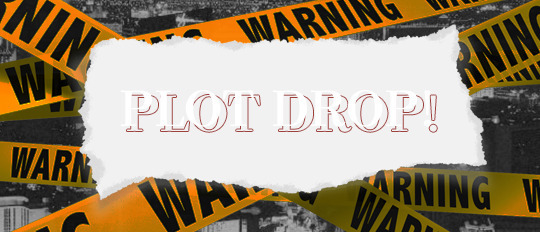
THE TRUTH OF THE MATTER...
Two shots rang out on the night as the sun finished it’s rotation around the sun. To say 2023 started off with a bang to anyone outside the Midnight Underground would earn a laugh, but for the people within it they knew just how true of a statement it was. Hollis Fiala, one of their candidates, had been shot at Thaddeus James’ new year celebration event. Word spreads like wildfire and by the time the Unaware police have finished scoping the scene and been properly frightened or bribed away by those with money to burn, rumors have already been in wide speculation.
A young wolf named Tabitha Spencer, the sister to Damian Harker’s nephew, has been detained for suspicion of attempted murder. The only people near the gun were her and Mayor Jose Alves Cruz. It comes out quickly that Jose was injured in the attack, a thrall to Hollis themself, and the tide turns just as soon. Before there has even been a trial many of those in the Underground have decided her guilty. What other sense would there be in it?
Our inhabitants, as those trained to be ever vigilant and paranoid are swift to do, construct elaborate theories about the crime and its motivations. Perhaps Karlha had orchestrated the entire event in hopes of making competition less steep. Or maybe Damian had promised his pseudo-niece something for the same. Sympathy turns to the injured heir with their iron bullet wound and you can hear whispers and praise of the elegance with which they handled the night. Even those outside the wild circle are want to give them credit lest they seem suspicious in a conspiracy themselves.
The people do not know of what you know, my dears, for they are never the wiser of The Oracle’s visions of a doomed world consumed by darkness after Karlha’s death. To them it is an isolated incident. At least, for now.
You are charged with determining, and perhaps proving, Tabitha’s innocence during the night. The charges for these crimes are heavy and it would likely be off with her head.
THE FATES ARE CRUEL AND KIND...
When asked to roll for something, the DM:
They rolled....a 19 (critical success): The people of the Midnight Underground take Hollis’ side and believe Tabitha is the shooter.
When asked to roll for choice:
Kellan, Connor, Nora, and Esme rolled highest: They were chosen as the emissaries for their respective circles.
IMPLICATIONS FOR THE GAME...
We have our Emissaries who are to be conducting interviews and collecting evidence to the best of their abilities. Should you be conducting interviews with NPCs, we will be posting the information for you on the NPC blog in interview format for you to look. Should you be conducting interviews with a PC, please decide with that person how you’re going to conduct the interview so we can compile what was said by them somewhere for eyes to look upon. For physical evidence, such as the gun, we will be opening up a channel in the discord for our four emissaries to interact with it. Below is an indication of who each Emissary will have to interview. Those bolded are NPCs.
Connor: Connor Talbot I, Catherine Talbot, Rina Mochizuki, Rosemary Loup, Matthew Coleman-Reyes, Karlha Whitlock, Tabitha Spencer, and Lilith Gaumond
Kellan: Dr. Henry Jones, Cameron Kiskadden, Elias Hart, Jose Alvez Cruz, and Damian Harker
Esmeray: Hollis Fiala and Carmen Blakely
Nora: Chloe Li, Yasaminia Ahmadi, Thaddeus James, and Sebastian Harker
Good luck my darling dears. Try not to look too closely or you’ll spin yourselves into a tizzy.
Sincerely,

4 notes
·
View notes
Text

The Strange Tale of Al Capone’s big brother
Vincenzo “Jimmie” Capone, alias Richard J. “Two-Gun” Hart
9 notes
·
View notes
Note
did you say John/Ianto 👀👀 because same
I did indeed, Anon! Truth is, I spend at least half my time thinking about John/Ianto because I'm predictable trash 😩💅
I’m taking the opportunity to answer @grinchwrapsupreme too since I feel it’s on the same wavelength:

Well... I have several John/Ianto AU ideas that I think about on the regular, including but not limited to:
the one based on that one Buffy episode where dark!Ianto from a parallel universe is dropped in the canon universe post-season 2 and makes everyone think Ianto's affected by some weird alien thing because he’s acting so weird (until they realise it’s a whole other Ianto. Jack probably makes a threesome joke). Of course, canon!Jack and canon!Gwen are too straight-laced and vanilla for dark!Ianto so he decides to see if he can find John, because John is always a good time, and he’s always down for a bender ;) Long story short, they go on a bender. John is very confused at first, but dark!Ianto is such an unexpected delight, he soon decides to go with it. (I currently have 4 variations of this AU in my head because it turns out it could be a lot of fun to drop other dark!team characters as well and have them wreak havoc; all of the variations include John/Ianto, and all of them include polyamory, at least in spirit if not in execution)
the one where 21-year-old!Ianto who's working in T1 meets time agents Javic (just 'Javic', like 'Cher' or 'Prince') and John Hart (pseudonym) and becomes entangled with their case (and them ;) ) so he has a whirlwind romance with both of them for the few weeks it takes them to do whatever it was they were tasked with before they disappear again. He knew it couldn’t last, of course, but Ianto’s still disappointed; it’s still hard to let go. Imagine Ianto's surprise when he later runs into the leader of Torchwood Three when he shows up to argue with Yvonne over [random excuse]! Except... Javic doesn't seem to remember him at all, and John is nowhere to be found... 👀
the one where Ianto is a vampire and Jack is a succubus and John is sometimes invited into their relationship because why not
the really long elaborate one that started as a CoE fix-it AU but also was me trying to force Ianto and John into a situation where they had to work together and learn to trust each other without Jack being there and oops they end up falling in love and also being badasses and going on space adventures but they’re also both still in love with Jack so as soon as they can get back to him this leads to John/Jack/Ianto ot3
the one where Ianto wants more from Jack than Jack’s willing or capable of giving him, so Ianto leaves, only Torchwood isn’t the kind of job you can just quit, and retcon doesn’t exactly sound appealing to him, and also he’s very, very angry about Jack’s emotional unavailability and he’s depressed and feeling self-destructive, so what he does is he escapes into space. And who other than John motherfucking Hart does he run into in a nondescript space bar? 👀 (John knows a thing or two about running, and also about self-destructive behaviours and unhealthy coping mechanisms. John has also been lowkey wanting a piece of Eye Candy since he put a gun to his face and the man bared his teeth at him in response. Now it looks like he might get the chance.)
the sequel to You Got Me On Edge (Any Minute I Might Jump) (also a John/Jack/Ianto one). This one is pure fluff.
the proper Buffy AU I keep thinking about despite my best efforts, I blame James Marsters for being so good at making himself look soft and vulnerable even when he’s playing a character who is Such a Fucking Asshole™
I’m sure I’m forgetting some, but I like the general idea of John joining the team and slowly gaining everyone’s trust (and coming to love all of them while becoming more trustworthy while also still being a Bastard ❤) so take that one as a given. It goes without saying that Ianto and John fall in love and have a nice happy triad situation with Jack in this scenario. Sometimes, John dates other people too. Sometimes it’s a closed triad. Always, they’re very happy. A classic I often use as the backdrop for other ideas.
31 notes
·
View notes
Photo
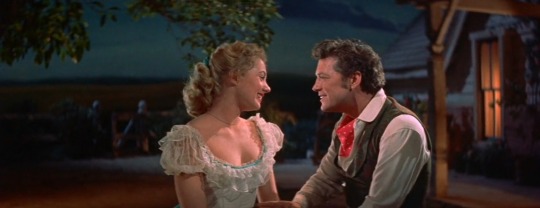
Oklahoma! (1955)
Composer Richard Rodgers was in search of a new songwriting partner in the early 1940s. His previous partner, the lyricist Lorenz Hart, was devolving into an alcoholism that would soon claim his life. Wanting to transform Lynn Riggs’ rustic play Green Grow the Lilacs into a musical, Rodgers would find a new lyricist in Oscar Hammerstein II, who had not been involved in any Broadway successes for some time. Rodgers and Hammerstein’s 1943 adaptation of Rigg’s play was Oklahoma! and – despite widespread predictions that Broadway audiences would only flock to modern, urbane works – it became the longest-running Broadway musical for another dozen or so years. It began one of the most fruitful, important, and accomplished musical theater partnerships in the medium’s history.
Interest in a cinematic treatment from Hollywood’s major studios for the first Rodgers and Hammerstein musical came almost immediately after the initial reviews for Oklahoma!, but the rights went not to a movie studio, but a film equipment start-up known as the Magna Theatre Corporation. Magna’s owners intended Oklahoma! as a test for the Todd-AO widescreen process (a rival to Cinerama), but more on that and the film’s unique distribution history – which involves RKO and 20th Century Fox – later. Most importantly, the lack of studio executives to appease meant that Rodgers and Hammerstein could have full control over the film’s structure and musical/narrative changes for this adaptation. Directed by Fred Zinnemann (1952’s High Noon, 1953’s From Here to Eternity) – an unorthodox choice, given his expertise for morally complex dramas and no musical experience – 1955’s Oklahoma! is a harbinger for the Rodgers and Hammerstein musical films to come, and an inextricable part of the duo’s legacy.
Somewhere in the Oklahoman countryside, amid corn as high as an elephant’s eye, is the clean-cut cowboy Curly McLain (Gordon MacRae). Curly is en route to the farmstead of his crush, Laurey Williams (Shirley Jones in her cinematic debut), and Laurey’s aunt, Aunt Eller (Charlotte Greenwood). There, Curly invites Laurey to the box social scheduled for later that evening. Annoyed that it took him this long to ask her out, Laurey decides instead to go the box social with the Williams’ antisocial and intimidating farmhand, Jud Fry (Rod Steiger). Elsewhere at the train station, another cowboy, Will Parker (Gene Nelson) might be singing about how much he was entranced by Kansas City, but he is searching for his sweetheart, Ado Annie (Gloria Grahame) – herself entranced by traveling salesman Ali Hakim (Eddie Albert in brownface).
No members of the original Broadway cast reprised their roles for this film, which also stars Barbara Lawrence and character actors James Whitmore, Jay C. Flippen, and Roy Barcroft.
As Curly, MacRae is like a Broadway stage version of the characters Gene Autry or Roy Rogers might have played in another decade. MacRae, who started his career as a Broadway and radio singer, had just run down the end of his contract with Warner Bros. (signed in 1947) when he appeared in Oklahoma!. At Warners, he starred in a number of musicals including Look for the Silver Lining (1949) and opposite Doris Day in On Moonlight Bay (1951), but he had only starred in a film adaptation of stage musical once before. MacRae, despite a long hiatus from the Broadway stage, is a natural here: charming and exuding a natural chemistry with co-star Shirley Jones. This exterior, however, is not without malice – as seen in the scene where Curly tries to influence Jud to commit self-harm. Cut from the same baritone cloth like contemporary Howard Keel (Frank Butler in 1950’s Annie Get Your Gun, Adam Pontipee in 1954’s Seven Brides for Seven Brothers), MacRae never achieved the popularity that other stage-to-screen musical stars of the ‘30s and ‘40s did (and, of course, Julie Andrews much later on).
The film’s surprise package for audiences in 1955 was in Shirley Jones. Jones, rather than subjecting herself to a vetting process by a director, casting director, or studio executives, was hand-picked by Rodgers and Hammerstein. Stunned by her 1953 audition for the premiere of South Pacific but wanting more experience for the then-nineteen-year-old, the songwriting duo kept Jones in mind for future productions and signed her on a contract (Jones was the first and only singer to be contracted to Rodgers and Hammerstein). With a few years of Broadway productions under her belt, Jones still came to Oklahoma! lacking an understanding on how to tailor sharper emotions to a film camera. With Fred Zinnemann’s assistance, she navigates Laurey’s light romantic comedy scenes and tumultuous friendship (if one can call it that) with Jud maturely – one could scarcely believe this is her cinematic debut. For Laurey, she accentuates the character’s naïveté, especially in respect to how she acts around men and romantic idealizations, without feeling grating or overacting (a common problem when approaching characters without much life experience) the part. Jones’ excellence in Oklahoma! would land her the lead in Carousel (1956), with other Hollywood hits in Elmer Gantry (1960) and The Music Man (1962) to follow.
As their artistic collaboration progressed, Rodgers and Hammerstein did not shy away from asking heavier questions in their musicals. Their first two projects, Oklahoma! and the musical film State Fair (1945) are relatively airy, flighty compared to their successors – the darkness of morality in Carousel, the racist beliefs of the lead character in South Pacific. Foreshadowing that later drama in successive musicals is the misanthropic (not just misogynistic) character of Jud Fry. Played by Rod Steiger, Jud is a villain without any redeeming qualities in the original musical. Steiger’s Jud remains a reprehensible character, but Steiger – as have most other actors who have played Jud in on stage in the decades since – positions Jud as more of a loner whose social ineptitude results in an unchecked covetousness over Laurey. To some reading that last sentence, that distinction between portrayals of Jud may not make any meaningful difference in one’s negative opinions about the character and his actions. Yet, Steiger’s portrayal of Jud – as sloppy, maladjusted, knowing little else about life other than farm work – is nevertheless a refinement on the character Rodgers and Hammerstein originally did not give much thought to.
Zinnemann’s dramatic tendencies needed moderation, as they sometimes threated to overshadow the musical features. Although, to Zinnemann’s credit, as a dramatist first, he imbues Oklahoma! with a dramatic fervor that came to define all Rodgers and Hammerstein musical film versions after it – something that one never received from the somewhat assembly line-like musical from Metro-Goldwyn-Mayer (MGM) and Fox. Oklahoma! was Zinnemann’s first widescreen film, as well as the first time he shot in color. The emotional intensity of his earlier movies would be antithetical to the sweeping rural cinematography that he and cinematographer Robert Surtees (1959’s Ben-Hur, 1971’s The Last Picture Show) and Floyd Crosby (1931’s Tabu: A Story of the South Seas, 1960’s House of Usher) needed to capture. Zinnemann, Surtees, and Crosby offer sumptuous images of the Arizona countryside (Oklahoma’s oil wells proved too plentiful and distracting for the production) and the inviting blue sky that overhangs the cornfields sweeping across the land. With widescreen cameras rather new around 1955, the cameras wisely stay further back in interior scenes (shot at MGM’s studios in Culver City, California) with numerous people, directing our gaze centrally with brilliant blocking from the actors. The staging nevertheless feels like a stagebound musical during some interior scenes, like a lower-budget MGM musical with a trivial plot.
The widescreen cinematography, of course, was purposefully a showcase – see the shots of Gene Nelson spinning his rope directly towards the camera in “Kansas City” and the shot of an overly-excited auctioneer hammering their gavel and having the gavel nearly break the camera in another. Magna Theatre Corporation intended Oklahoma! to be a demonstration of their new Todd-AO 70mm process, in hopes of competing against Cinerama (which used three synchronized projectors at once on a curved screen). Because some theaters could not support the widescreen prints, two different versions of Oklahoma! exist: one in Todd-AO and another in CinemaScope (the latter a 20th Century Fox invention). This review is based on the Todd-AO print – which I recommend over the CinemaScope print – that currently is streaming on Disney+. Another note about the Todd-AO print: the first two films shot on Todd-AO 70mm – Oklahoma! and Around the World in Eighty Days (1956) – were shot in 30 frames per second (FPS) rather than the standard twenty-four. Thus, the Todd-AO print will appear slightly smoother in motion than most all other films, including modern ones.
Why 30 FPS for film screenings in 1955? Higher frames per second result in less noticeable light flickering and more dynamic colors (these effects for movies shot at higher FPS rates only apply to films shot on film stock, not digital). However, film projectors with a Todd-AO print would run hotter, requiring simultaneous cooling of the film while it ran through the projector. All subsequent films shot on Todd-AO reverted to the standard twenty-four frames per second.
youtube
Diehard musical fans often consider Fred Zinnemann’s Oklahoma! the most faithful – narratively, musically – of all the Rodgers and Hammerstein film adaptations. Deleted from Oklahoma! are two songs: Ali Hakim’s chauvinistic “It’s a Scandal, It’s a Outrage! [sic]” and Jud’s brooding “Lonely Room”. The former has among the least musical interest in the entire musical, but “Lonely Room” might have been a helpful source of characterization of Steiger’s Jud (the limited vocal range required for the song would suit Steiger). Otherwise, some of Rodgers and Hammerstein’s most iconic songs are present, starting with “Oh, What a Beautiful Mornin’”. Sung solo by MacRae on horseback (as opposed to being sung completely offstage in the original stage version), it serves the same purpose as the title song from The Sound of Music (1965) does. It establishes Curly’s character (mostly), and establishing the vast environs where the film takes place. The atmospheric opening shot of the camera moving through the corn and opening up into a grassy landscape might seem corny inane, but what a visual message it sends for one of the early widescreen American movies. Curly’s solo leads into “The Surrey with the Fringe on Top”, as he attempts to woo Laurey into accompanying him to the box social. A brief visual aside to allow viewers who do not know what a surrey looks like is a touch that a stage musical cannot provide, but this song – along with my choice of the best song in the musical, “People Will Say We’re in Love” (which gives MacRae and Jones a lovely duet with the production’s most romantic melodies) – exemplifies the rapport between MacRae and Jones and their two characters.
There remains charm aplenty across the musical score. Gene Nelson’s rendition of “Kansas City” is by no means essential to the plot of Oklahoma!, but it is a diverting number with some fancy footwork by not only Nelson (essentially the film’s comic relief and using a perfect, non-jarring voice for such a role), but Charlotte Greenwood and the scene’s extras as well. And then, arriving late, there is also the lively title song, delivered by MacRae with a similar energy as he employs for “Oh, What a Beautiful Mornin’”. “Oklahoma” became the official state song for Oklahoma in 1953, replacing a lesser-known song, “Oklahoma – A Toast”. Credit must also go to the extras and chorus for spearheading the song for its second half, as well as Robert Russell Bennett for his gorgeous (and definitive) vocal arrangement.
As its theatrical release drew near, details of the distribution of Oklahoma! would depend on which print a theater received. If a movie theater screened the Todd-AO 70mm print, Magna handled the distribution; if they showed the anamorphic CinemaScope 35mm print, the responsibility fell to RKO. RKO – the studio that gave audiences King Kong (1933), Citizen Kane (1942), and distributed all Disney movies until Rob Roy: The Highland Rogue (1954) – had fallen into turmoil by the mid-1950s and, by decade’s end, would be the first of the Big Five Hollywood studios to cease operations. The studio’s tyrannical owner, the eccentric Howard Hughes, disemboweled the studio from the inside out, and is a story for another day. Due to Hughes’ mismanagement, RKO withdrew from distribution and, in their place, came 20th Century Fox. Todd-AO and Fox shared theatrical and home media rights until Fox’s purchase by Disney in 2019; Todd-AO and Disney retain the split-ownership arrangement over Oklahoma!.
Though Oklahoma! is not usually part of most cinephiles’ and musical nerds’ pantheons of great Hollywood musicals, its contributions to the subsequent Rodgers and Hammerstein film adaptations are unmistakable. The duo’s closeness to numerous parts of the film’s production, the stunning widescreen cinematography, and the casting of actors with proven musical ability are hallmarks to be replicated, even in lesser adaptation such as South Pacific (1958) and Flower Drum Song (1961). For Rodgers and Hammerstein, they were so pleased from working with Fox that they continued to provide the rights to their musicals for all of their works’ adaptations with the exception of Flower Drum Song (which went to Universal). Like their work on Broadway, their best music and best movie adaptations of their musicals was yet to arrive. Oklahoma! marks a solid, healthy start to that run of adaptations, a hallmark of mid-century American moviemaking.
My rating: 7.5/10
^ Based on my personal imdb rating. My interpretation of that ratings system can be found in the “Ratings system” page on my blog (as of July 1, 2020, tumblr is not permitting certain posts with links to appear on tag pages, so I cannot provide the URL).
For more of my reviews tagged “My Movie Odyssey”, check out the tag of the same name on my blog.
#Oklahoma!#Rodgers and Hammerstein#Fred Zinnemann#Gordon MacRae#Shirley Jones#Gene Nelson#Gloria Grahame#Charlotte Greenwood#Rod Steiger#James Whitmore#Richard Rodgers#Eddie Albert#Oscar Hammerstein II#Robert Surtees#Floyd Crosby#My Movie Odyssey
10 notes
·
View notes
Text
Night at the Museum Wing AU
(AU by @multiversal-madness)
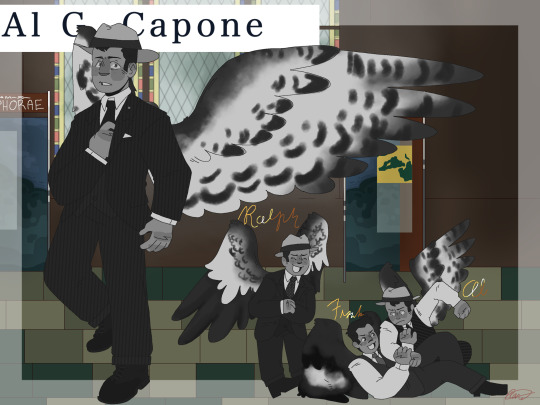
I love this AU so much!
I based Al's wings off of a red-tailed hawk! Al always “thought of himself as “American” rather than Italian or even Italian-American.” (Al Capone by Deirdre Bair) The screech used for the Bald Eagle in Hollywood is actually the call of a red-tailed hawk!
Ralph's wings are based off a Rüppell's Vulture/ a Griffon Vulture. I don't have a lot of reason why, I just felt he should be a large bird of prey with feathers close to Al's. Griffon Vultures hold the record for the highest flying bird in the world!
Frank is based off a Northern Mockingbird. They are known for being very smart birds. They are also very aggressive and territorial, like Frank was. I feel I could have picked a bird of prey to fit in with his brothers, but I think a Northern Mockingbird suits him because of his description of being the best looking and mild-mannered brother.
(Colored Version below the cut)
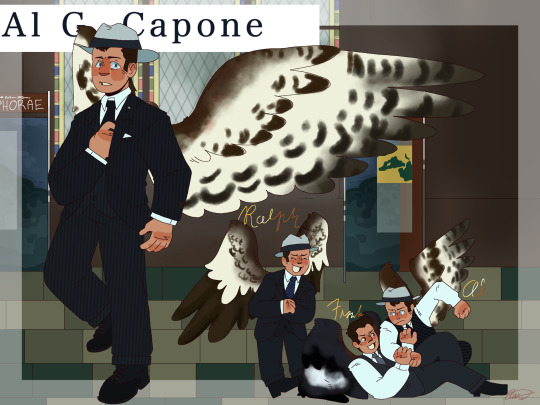
I love this AU a lot! I want to make more art for it. Multi says that "Those born in and later than 1900 have wings while some born 1890 to 1900 might have wings", which lets all the Capone siblings have wings! Ralph was born in 1894, Frank in 1895, and Al in 1899!
Since I headcanon Jimmy/Richard James "Two-Gun" Hart to be in Jed's group, I'm not sure if he would have wings! Especially since he was born in 1892. Maybe he did, but when he was made into a Miniature, they weren't added?
#frosty's art#NATM#natm 2#natm au#al capone natm#natm al capone#natm Frank Capone#natm Ralph Capone#Al Capone#Ralph Capone#Frank Capone#June. 8#2023#June. 2023#Richard James “Two-Gun” Hart#Jimmy Capone#NATM Wings AU#The small drawing of the Brothers bickering in the corner is based off of an episode of Boardwalk Empire
56 notes
·
View notes
Photo

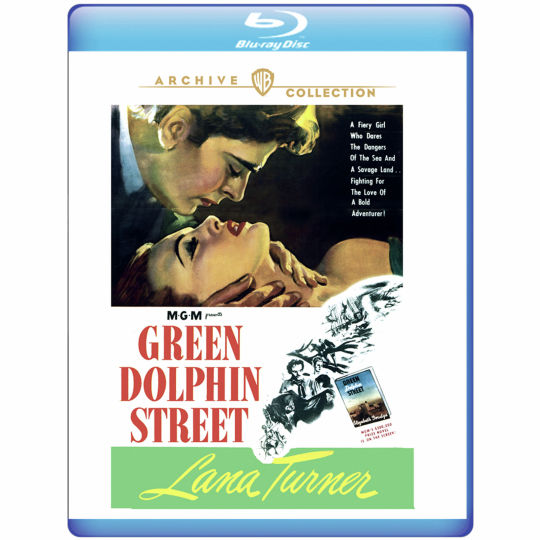
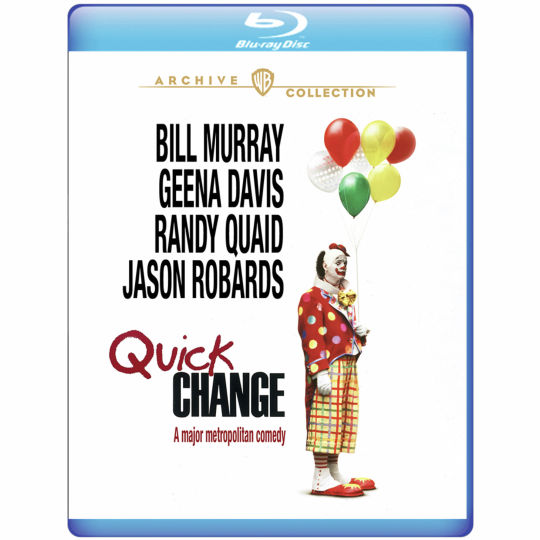

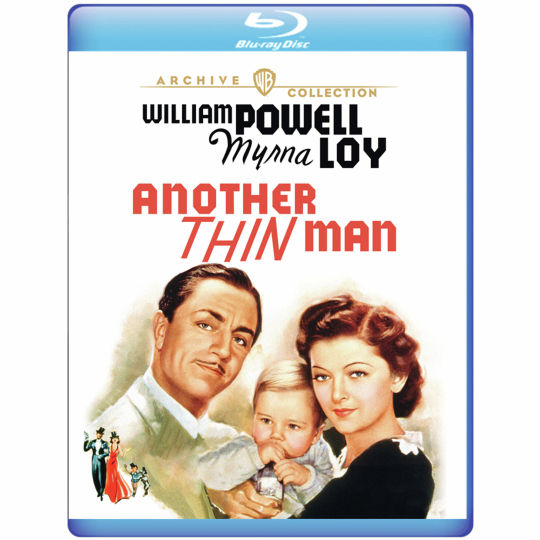
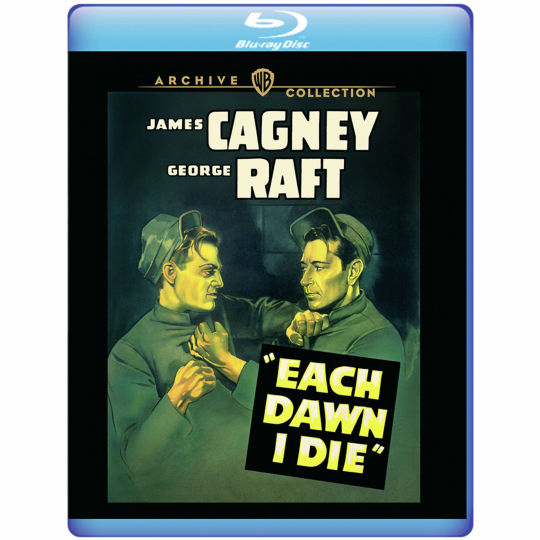

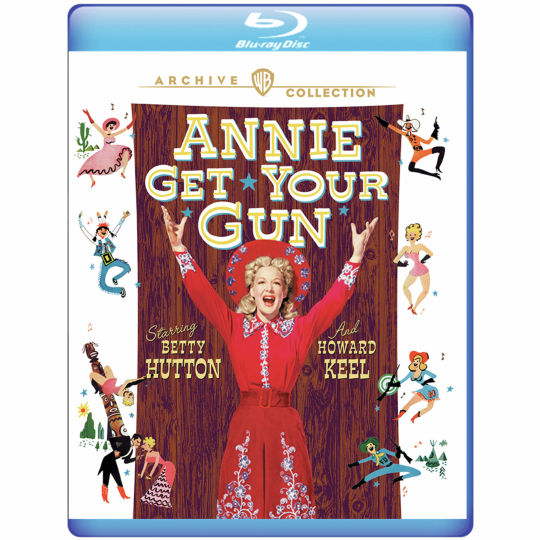
Coming in April!
NEW 2020 1080p HD masters JOSIE AND THE PUSSYCATS IN OUTER SPACE
Run Time 352:00
Subtitles English SDH
Audio Specs DTS HD-Master Audio 2.0 - English, MONO - English
Aspect Ratio 1.33:1 4x3 FULL FRAME
Product Color COLOR
Disc Configuration 2 BD 50
Rock stars Josie and the Pussycats are out of this world...literally! When the bumbling Alexandra accidentally launches Josie and the gang into outer space, they travel through the galaxy searching for a path back to Earth. Along the way, they meet cat people, robot monsters, evil dictators, space pirates and plenty of strange creatures, including their new companion Bleep, voiced by Hanna-Barbera legend Don Messick. Fortunately, everyone’s a fan of Josie and the Pussycats, including aliens! Rocket through the universe with your favorite superstars as they save the day, sing some songs and have a hip-happenin’ good time in a 2-disc, 16-episode Josie and the Pussycats in Outer Space complete series collection that hits all the right notes!
NEW 2021 1080p HD Master Sourced from 4K scan of preservation film elements!
GREEN DOLPHIN STREET
Run Time 141:00
Subtitles English SDH
Audio Specs: DTS HD-Master Audio 2.0 - English, MONO - English
Aspect Ratio: 1.37:1 4x3 FULL FRAME
Product Color BLACK & WHITE
Disc Configuration BD 50
Special Features: Lux Radio Theater Broadcast; Theatrical Trailer (HD)
The Academy Award® winner about star-crossed love that spans the years – and the globe. After her triumph as the lunchroom temptress in the crime classic The Postman Always Rings Twice, Lana Turner expanded her range with Green Dolphin Street. Set in 19th century Europe and New Zealand, this sweeping romance tells the story of two beautiful sisters, one headstrong (Turner) and one gentle (Donna Reed), and of the man (Richard Hart) who marries one even though he loves the other. The film’s riptides of emotion are matched by breathtaking physical tumult: a fierce Maori uprising plus a catastrophic earthquake and tidal wave that earned the film a 1947 Oscar® for special effects. With its dramatic story and spectacular visuals, Green Dolphin Street drew huge audiences for epic moviemaking, being one of the top-ten box office hits of the year.
NEW 2021 1080p HD Master Sourced from 4K scan of Nitrate preservation elements!
BROADWAY MELODY OF 1940
Run Time 102:00
Subtitles English SDH
Audio Specs: DTS HD-Master Audio 2.0 - English, MONO - English
Aspect Ratio: 1.37:1 4x3 FULL FRAME
Product Color BLACK & WHITE
Disc Configuration BD 50
Special Features: Making-of Featurette: "Begin the Beguine" (hosted by Ann Miller); "Our Gang Comedies: The Big Premiere"; MGM Cartoon: "The Milky Way" ; Original Theatrical Trailer (HD)
The job – a career breakthrough – is supposed to go to hoofer Johnny Brett, but a mix-up in names gives it to his partner. Another example of Broadway hopes dashed? Not when Johnny is played by Fred Astaire. Sparkling Cole Porter songs, clever comedy and dance legends Astaire and Eleanor Powell make the final Broadway Melody (co-starring George Murphy) a film to remember. Powell’s nautical “All Ashore" routine (a/k/a I Am the Captain”), Astaire’s blissful “I’ve Got My Eyes on You” and Fred & Eleanor's elaborate routine to Cole Porter's classic "I Concentrate On You" are more than enough to please any fan. But they’re just a warm-up for the leads to tap one finale number into immortality: “Begin the Beguine,” introduced by Frank Sinatra in That’s Entertainment! with, “You can wait around and hope, but you’ll never see the likes of this again.”
NEW 2021 1080p HD Master Sourced from a new 4K restoration of the last-known surviving nitrate Technicolor print!
DOCTOR X (1932)
Run Time 76:00
Subtitles English SDH
Audio Specs: DTS HD-Master Audio 2.0 - English, MONO - English
Aspect Ratio: 1.37:1 4x3 FULL FRAME
Product Color COLOR; BLACK & WHITE
Disc Configuration BD 50
Special Features: Alternate B&W version of feature; DOCTOR X (HD): UCLA Before & After Restoration featurette (HD); New documentary: "Monsters and Mayhem: The Horror Films of Michael Curtiz (HD); New feature commentary by author/film historian Alan K. Rode; Archival feature commentary by Scott MacQueen, head of preservation, UCLA Film and Television Archive. Original B&W Theatrical Trailer (HD)
Is there a (mad) doctor in the house? “Yes!” shrieks Doctor X, filmed in rare two-strip Technicolor®. An eminent scientist aims to solve a murder spree by re-creating the crimes in a lab filled with all the dials, gizmos, bubbling beakers and crackling electrostatic charges essential to the genre. Lionel Atwill is Doctor Xavier, pre-King Kong scream queen Fay Wray is a distressed damsel and Lee Tracy snaps newshound patter, all under the direction of renowned Michael Curtiz. The new two-color Technicolor master was restored by UCLA Film and Television Archive and The Film Foundation in association with Warner Bros. Entertainment. Funding provided by the Hobson/Lucas Foundation. Also includes the separately filmed B&W version (which has been restored and restored from its original nitrate camera negative) originally intended for small U.S. markets and International distribution, and which has been out of distribution for over 30 years.
NEW 2021 1080p HD Master Sourced from 4K scan of original nitrate Technicolor negatives!
ANNIE GET YOUR GUN (1950)
Run Time 107:00
Subtitles English SDH
Sound Quality DTS HD-Master Audio 2.0 - English
Aspect Ratio 1.37:1 4x3 FULL FRAME
Product Color COLOR
Disc Configuration BD 50
Special Features: Susan Lucci retrospective & intro piece (from 2000 DVD release); Outtakes: Let’s Go West Again-Betty Hutton, Doin’ What Comes Natur’lly-Judy Garland, I’m an Indian, Too-Judy Garland, Colonel Buffalo Bill with Howard Keel and Frank Morgan; Stereo audio pre-recording session tracks including There’s No Business Like Show Business featuring Judy Garland; Theatrical Re-issue Trailer (HD)
Betty Hutton (as Annie Oakley) and Howard Keel (as Frank Butler) star in this sharpshootin’ funfest based on the 1,147-performance Broadway smash boasting Irving Berlin’s beloved score, including “Doin’ What Comes Natur’lly,” “I Got the Sun in the Morning” and the anthemic “There’s No Business Like Show Business.” As produced by Arthur Freed, directed by George Sidney, and seen and heard in this new remastered HD presentation, this lavish, spirited production showcases songs and performances with bull’s-eye precision, earning an Oscar®* for adaptation scoring. The story is a brawling boy-meets-girl-meets-buckshot rivalry. But love finally triumphs when Annie proves that, yes, you can get a man with a gun!
NEW 2021 1080p HD Master! QUICK CHANGE (1990)
Run Time 88:00
Subtitles English SDH
Sound Quality DTS HD-Master Audio 2.0 - English
Aspect Ratio 1.85:1, 16 X 9 WIDESCREEN
Product Color COLOR
Disc Configuration BD 25
Special Feature: Theatrical Trailer
The star of Caddyshack, Ghostbusters and Groundhog Day headlines and codirects this uproarious Big Apple heist-and-pursuit caper. Bill Murray plays Grimm, a frazzled urbanite who disguises himself as a clown – and sets out to rob a bank. Geena Davis and Randy Quaid play accomplices in Grimm’s daring scheme and Jason Robards is the blustery cop caught up in Grimm’s “Clown Day Afternoon.” Swiping a million bucks is a snap compared to getting out of town. Grimm and cohorts commandeer a car, a cab, a bus, a baggage tram and a plane (and encounter future stars Stanley Tucci and Tony Shalhoub in hilarious supporting roles) to make what becomes a less-than-merry escape. But for comedy lovers, Quick Change is a ticket to ride!
NEW 2021 1080p HD Master Sourced from 4K scan of best surviving nitrate preservation elements! EACH DAWN I DIE (1939)
Run Time 92:00
Subtitles English SDH
Audio Specs: DTS HD-Master Audio 2.0 - English, MONO - English
Aspect Ratio: 1.37:1 4x3 FULL FRAME
Product Color BLACK & WHITE
Disc Configuration BD 50
Special Features: Warner Night at the Movies including 1939 Short Subjects Gallery: Vintage Newsreel, WB Technicolor Short: "A Day at Santa Anita", WB Cartoon: "Detouring America"; Restrospective featurette: "Stool Pigeons and Pine Overcoats: The Language of Gangster Films" ; Feature Commentary by Film Historian Haden Guest; Breakdowns of 1939: Studio Blooper Reel; WB Cartoon: "Each Dawn I Crow"; Radio show w/George Raft & Franchot Tone; Trailer for "Wings of the Navy" and Original Theatrical Trailer for Each Dawn I Die (HD)
Framed for manslaughter after he breaks a story about city corruption, reporter Frank Ross is sure he’ll prove his innocence and walk out of prison a free man. But that’s not how the system works at Rocky Point Penitentiary. There, cellblock guards are vicious, the jute-mill labor is endless, and the powers Ross fought on the outside conspire to keep him in. Frank’s hope is turned to hopelessness. And he’s starting to crack. Two of the screen’s famed tough guys star in this prison movie that casts a reform-minded eye on the brutalizing effects of life in the slammer. James Cagney “hits a white-hot peak as [Ross,] the embittered, stir-crazy fall guy” (Leonard Maltin’s Movie Guide). And George Raft (Cagney’s friend since their vaudeville days) portrays racketeer Hood Stacey, who may hold the key to springing Ross.
NEW 2021 1080p HD Master Sourced from 4K scan of best surviving preservation elements!
ANOTHER THIN MAN (1939)
Run Time 102:00
Subtitles English SDH
Audio Specs: DTS HD-Master Audio 2.0 - English, MONO - English
Aspect Ratio: 1.37:1 4x3 FULL FRAME
Product Color BLACK & WHITE
Disc Configuration BD 50
Special Features: M-G-M Musical Short: Love on Tap; Classic M-G-M Cartoon: The Bookworm
Dum-Dum, Wacky, Creeps, Fingers: They’re just a few of the hoodlums in the world of amateur sleuths and professional bon vivants Nick and Nora Charles. And now there’s a new hood: parenthood. A birthday – make that boithday – party that some of da boys hold for infant Nick Jr. is part of the fun in this third film in the witty series. The case begins when the Charles family arrives for a weekend with a Long Island industrialist who fears someone wants to kill him. Sure enough, his fears come true. Nick (William Powell) is among the suspects. Asta scrams with what may be the murder weapon. And Nora (Myrna Loy) has her own ideas about the case and sneaks off to a nightclub to ferret out a clue. “Madam, how long have you been leading this double life?” Nick asks. “Just since we’ve been married,” she replies.
22 notes
·
View notes
Text
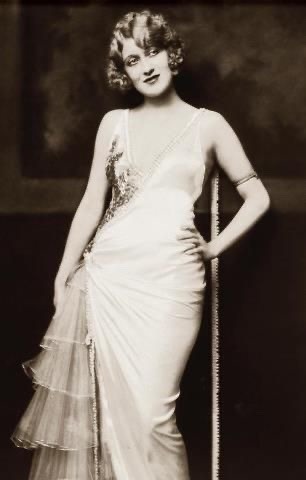
Ruth Etting (November 23, 1896 – September 24, 1978) was an American singing star, vaudevillian and actress of the 1920s and 1930s, who had over 60 hit recordings and worked in stage, radio, and film. Known as "America's sweetheart of song", her signature tunes were "Shine On, Harvest Moon", "Ten Cents a Dance" and "Love Me or Leave Me".
Her other popular recordings included "Button Up Your Overcoat", "Mean to Me", "Exactly Like You" and "Shaking the Blues Away".
As a young girl in Nebraska, Etting had wanted to be an artist; she drew and sketched everywhere she was able. At sixteen, her grandparents decided to send her to art school in Chicago. While Etting attended class, she found a job at the Marigold Gardens nightclub; after a short time there, Etting gave up art classes in favor of a career in show business. Etting, who enjoyed singing in school and church, never took voice lessons. She quickly became a featured vocalist at the club. Etting was then managed by Moe Snyder, whom she married in 1922. Snyder made arrangements for Etting's recording and film contracts as well as her personal and radio appearances. She became nationally known when she appeared in Flo Ziegfeld's Follies of 1927.
Etting intended to retire from performing in 1935, but this did not happen until after her divorce from Snyder in 1937. Harry Myrl Alderman, Etting's pianist, was separated from his wife when he and Etting began a relationship. Snyder did not like seeing his former wife in the company of other men and began making telephone threats to Etting in January 1938. By October, Snyder traveled to Los Angeles and detained Alderman after he left a local radio station; he forced the pianist to take him to the home of his ex-wife at gunpoint. Saying he intended to kill Etting, Alderman, and his own daughter, Edith, who worked for Etting, Snyder shot Alderman. Three days after Alderman was shot, his wife filed suit against Etting for alienation of affections.
While Alderman and Etting claimed to have been married in Mexico in July 1938, Alderman's divorce would not be final until December of that year. The couple was married during Moe Snyder's trial for attempted murder in December 1938. Etting and Alderman relocated to a farm outside of Colorado Springs, Colorado, where they were primarily out of the spotlight for most of their lives. Her fictionalized story was told in the 1955 musical film Love Me Or Leave Me with Doris Day as Ruth Etting and James Cagney as Snyder.
Etting was born on November 23, 1896, in David City, Nebraska, to Alfred Etting, a banker, and Winifred (Kleinhan). Her mother died when she was five years old and she then went to live with her paternal grandparents, George and Hannah Etting. Her father remarried and moved away from David City and was no longer a part of his daughter's life. Etting's grandfather, George, owned the Etting Roller Mills; to the delight of his granddaughter, George Etting allowed traveling circuses and shows to use the lot behind the mills for performances.
Etting was interested in drawing at an early age; she drew and sketched anywhere she was able. Her grandparents were asked to buy the textbooks she had used at the end of a school term because Etting had filled them with her drawings. She left David City at the age of sixteen to attend art school in Chicago. Etting got a job designing costumes at the Marigold Gardens nightclub, which led to employment singing and dancing in the chorus there. She gave up art school soon after going to work at Marigold Gardens. Before turning exclusively to performing, Etting worked as a designer for the owner of a costume shop in Chicago's Loop; she was successful enough to earn a partnership in the shop through her work.
While she enjoyed singing at school and in church, Etting never took voice lessons. She said that she had patterned her song styling after Marion Harris, but created her own unique style by alternating tempos and by varying some notes and phrases. Describing herself as a "high, squeaky soprano" during her days in David City, Etting developed a lower range singing voice after her arrival in Chicago which led to her success. Her big moment came when a featured vocalist suddenly became ill and was unable to perform. With no other replacement available, Etting was asked to fill in. She quickly changed into the costume and scanned the music arrangements; the performer was male, so Etting tried to adjust by singing in a lower register. She became a featured vocalist at the nightclub.
Etting described herself as a young, naive girl when she arrived in Chicago. Due to her inexperience in the ways of the big city, she became reliant on Snyder after their meeting. Etting met gangster Martin "Moe the Gimp" Snyder in 1922, when she was performing at the Marigold Gardens. Snyder, who divorced his first wife to marry Etting, was well-acquainted with Chicago's nightclubs and the entertainers who worked in them; he once served as a bodyguard to Al Jolson. Snyder also used his political connections to get bookings for Etting, who was called "Miss City Hall" because of Snyder's influence in Chicago. Etting married Snyder on July 17, 1922 in Crown Point, Indiana. She later said she married him "nine-tenths out of fear and one-tenth out of pity." Etting later told her friends, "If I leave him, he'll kill me." He managed her career, booking radio appearances and eventually had her signed to an exclusive recording contract with Columbia Records.
The couple moved to New York in 1927, where Etting made her Broadway debut in the Ziegfeld Follies of 1927. Irving Berlin had recommended her to showman Florenz Ziegfeld. Etting nervously prepared to sing for Ziegfeld at the audition. However, he did not ask her to sing at all; only to walk up and down the room. She was hired on that basis because Ziegfeld did not hire women with big ankles. While the original plan for the show was for Etting to do a tap dance after singing "Shaking the Blues Away", she later remembered she was not a very good dancer. At the show's final rehearsal, Flo Ziegfeld told her, "Ruth, when you get through singing, just walk off the stage". Etting also appeared in Ziegfeld's last "Follies" in 1931.
She went on to appear in a number of other hit shows in rapid succession, including Ziegfeld's Simple Simon and Whoopee!. Etting was not originally signed to perform in Simple Simon; she became part of the cast at the last minute when vocalist Lee Morse was too intoxicated to perform. Ziegfeld asked Etting to replace Morse; she hurried to Boston, where the show was being tried out prior to Broadway. When Etting arrived, songwriters Rodgers and Hart discovered that the song "Ten Cents a Dance" was not written for Etting's voice range. The three spent the night rewriting the song so Etting could perform it.
Toward the end of Simple Simon's Broadway run, Etting persuaded Ziegfeld to add "Love Me Or Leave Me" to the show though the song was originally written for Whoopee!. She had recorded the song in 1928, but Etting's new version of it was impressive enough to earn her a Vitaphone contract to make film shorts.
In Hollywood, Etting made a long series of movie shorts between 1929 and 1936, and three feature movies in 1933 and 1934. She described the short films as either having a simple plot to allow for her to sing two songs or with no plot at all. The idea was to have Etting sing at least two songs in the film. While she received a marquee billing for Roman Scandals, Etting had only two lines in the film and sang just one song. Etting believed she might have had more success in full-length films if she had been given some acting lessons. Her perception was that the studios viewed her only as a vocalist. She later recalled, "I was no actress, and I knew it. But I could sell a song". In 1936, she appeared in London in Ray Henderson's Transatlantic Rhythm. Etting quit the show because she and the other performers had not been paid.
Etting was first heard on radio station WLS when she was living in Chicago. Her appearance drew so much fan mail the station signed her to a year's contract for twice weekly performances. She had her own twice weekly 15 minute radio show on CBS in the 1930s. By 1934, she was on NBC with sports announcer Ted Husing doing the announcing and Oldsmobile sponsoring her program.
After an unissued test made by Victor on April 4, 1924, Etting was signed to Columbia Records in February 1926. She remained at Columbia through June 1931, when she split her recording between ARC (Banner, Perfect, Romeo, Oriole, etc.) and Columbia through March 1933. She signed with Brunswick and remained there until May 1934, when she re-signed with Columbia through July 1935. After a solitary Brunswick session in March 1936, she signed with the British label Rex and recorded two sessions in August and September, 1936. Etting returned to the US and signed with Decca in December 1936 and recorded until April 1937, when she basically retired from recording.
Etting saved some of her paycheck each week, regardless of the amount she was making at the time. Her friends said she invested in California real estate rather than the stock market. Etting, who made many of her own clothes, did her own housekeeping and lived frugally, initially announced her retirement in 1935. It is not clear why she did not go through with her announced plans, but she issued a second statement regarding retirement after filing for divorce from Snyder in November 1937.
Snyder's aggressive and controlling management style began to cause problems for Etting; during her work with Whoopee! on Broadway, Snyder was a constant presence. He was never without a gun and enjoyed poking people with it while saying "Put your hands up!" then laughing when their fright was evident. Snyder also persisted in cornering Ziegfeld because he believed Etting's role in the musical could be improved. Ziegfeld had a different opinion and indicated nothing would be changed. Snyder would then mumble that it was not a suggestion but a demand.
By 1934 she was having difficulty getting engagements. Snyder's arguing and fighting at venues where Etting was employed caused her to be passed by for jobs in the United States. In 1936, she thought taking work in England might be the answer, but Snyder created problems while she was working there also. Soon after the couple arrived in England, Snyder became involved in a street fight which created adverse publicity for Etting. She divorced Moe Snyder on the grounds of cruelty and abandonment on November 30, 1937. Snyder did not contest the divorce and received a settlement from his former wife. Etting gave her ex-husband half of her earnings at the time, $50,000, some securities and a half interest in a home in Beverly Hills, California. She deducted the gambling debts of Snyder she had paid and the costs she had paid for a home for Snyder's mother.
Etting fell in love with her pianist, Myrl Alderman, who was separated from his wife. In January 1938, she began receiving threatening telephone calls from Snyder, who initially claimed Etting withheld assets from him when the divorce settlement was made. Though the couple was divorced, Snyder was also upset because of reports that she was seeing another man. Snyder told Etting that he would come to California and kill her. When Snyder telephoned and found Etting unavailable, he told his daughter Edith that he "would fix her ticket, too". He called again that evening; this time Etting took the call with her cousin, Arthur Etting, listening on an extension. Etting requested police protection after the telephone call and arranged for private protection. Apparently believing the danger was over when Snyder did not appear soon after his telephone call, Etting released her bodyguards a few days later.
On October 15, 1938, Snyder detained Myrl Alderman at a local radio station and forced the pianist to take him to his former wife at gunpoint. In the house at the time were Etting and Edith Snyder. Edith, Snyder's daughter by a previous marriage, worked for Etting and remained living with her after the divorce. Snyder held Etting and Alderman at gunpoint; when told his daughter was in another part of the house, he made Etting call her into the room. Snyder said he intended to kill all three, and told them to be quiet. When Myrl Alderman attempted to speak, Snyder shot him. Snyder then told his ex-wife, "I've had my revenge, so you can call the police."
Snyder claimed Myrl Alderman pulled a gun and shot at him first and that his ex-wife would not file charges against him because she still loved him. He also claimed he was drunk when he made the telephone threats to Etting in January 1938, saying that at the time his intentions were to kill both his ex-wife and himself. Ruth Etting said that the only gun in the home belonged to her, and after the shooting of Alderman, she was able to go into her bedroom and get it. Upon seeing Etting's gun, Moe Snyder wrested it away from her; it landed on the floor. Snyder's daughter, Edith, picked it up and held it on her father, shooting at him but hitting the floor instead. During a police reenactment of the shooting three days later, Edith Snyder said that she fired at her father to save Ruth Etting, weeping as she continued, "I don't yet know whether I am sorry I missed my Dad or whether I am glad". Snyder was accused of attempting to murder his ex-wife, his daughter, and Etting's accompanist, Myrl Alderman, the kidnapping of Alderman, as well as California state gun law violations.
Three days after the shooting of Myrl Alderman, the pianist's second wife, Alma, sued Etting for alienation of her husband's affections. Though Etting and Alderman claimed to have been married in Tijuana, Mexico in July 1938, Alma Alderman said any marriage was invalid, because her divorce from Myrl Alderman would not be final until December 1938. Police investigators could find no record of the couple's Mexican marriage. Etting publicly invited Alma Alderman to visit her husband in the hospital, in an effort to see if the couple could reconcile.
Ruth Etting testified that she was not married to Alderman. During the course of the trial, there was also a question of the validity of Alderman's marriage to Alma. Alderman's first wife, Helen, obtained an interlocutory decree on January 7, 1935; the divorce became final one year later. On January 9, 1935, Alderman married Alma in Mexico. The second Mrs. Alderman called Moe Snyder to the stand as a witness regarding an attraction between her husband and Etting. Helen Alderman Warne also appeared in court, claiming that Alma Alderman had spirited Myrl away from her. Warne added that she had married and divorced the pianist twice. Alma Alderman's lawsuit ended in December 1939, with the court finding that she was not entitled to damages from Ruth Etting.
The testimony in both trials brought much personal information into the public eye. Snyder, who claimed to still be in love with his ex-wife, gave Etting a diamond and platinum bracelet which she accepted after Snyder's telephone threat in January 1938. Etting testified that she agreed with her ex-husband's statement to police that Snyder was either drunk or out of his mind when he threatened her by phone. Snyder's attorney initially tried to prevent Etting from testifying against Snyder with a charge that the divorce she obtained in Illinois was invalid because she was a resident of California at that time.
During the trial, Snyder's attorney portrayed Ruth Etting as a calculating woman who had married Moe Snyder strictly for the benefit of her career, and that she divorced him in favor of being with another, younger man (Alderman). Snyder's attorney echoed his client's claim of self-defense and said his client never intended to kill Etting, his daughter, and Myrl Alderman. The attorney further claimed that if Snyder intended to kill the pianist, he had ample time to do so while he held a gun on Alderman during the drive from the radio station to the home where the shooting took place.
Etting married Alderman, who was almost a decade her junior, on December 14, 1938 in Las Vegas, during Moe Snyder's trial for attempted murder. Snyder was convicted of attempted murder, but released on appeal after one year in jail. Snyder won a new trial but returned to jail in January 1940 in lieu of bail. In August 1940, Myrl Alderman asked the district attorney to drop further prosecution attempts against Snyder for the 1938 shooting.
Etting, who had retired from performing prior to the shooting and subsequent trials, briefly had a radio show on WHN in 1947. She also accepted an engagement at New York's Copacabana in March 1947. Etting traveled alone to New York and during a newspaper interview, was asked if she had ever seen Moe Snyder again. She replied, "No, I hope I never do." and said that her husband never went to bed without a gun.
The couple relocated to an eight-acre farm outside of Colorado Springs in 1938. Alderman, who was raised in Colorado Springs, operated a restaurant there for a time. Etting and Alderman remained married until his death in Denver on November 28, 1966; he was buried in Evergreen Cemetery, Colorado Springs. Etting died in Colorado Springs in 1978, aged 81. She was survived by a stepson, John Alderman, and four grandchildren. Alderman and Etting are now interred at the Shrine of Remembrance Mausoleum in Colorado Springs, Colorado.
Her life was the basis for the fictionalized 1955 film, Love Me or Leave Me, which starred Doris Day (as Etting), James Cagney (as Snyder) and Cameron Mitchell (as Alderman). Etting, Myrl Alderman and Moe Snyder all sold their rights to the story to MGM; Snyder was living in Chicago in 1955. Etting expressed sadness that "the real highlight of my life", her marriage to Alderman, was omitted from the film. Shortly before her death, Etting said she thought the screen portrayal of her was too tough and that Jane Powell would have been a better choice for the lead.
Etting has a star on the Hollywood Walk of Fame for her work in films, located on the north side of the 6500 block of Hollywood Boulevard. Her recordings of Love Me Or Leave Me (2005) and Ten Cents a Dance (1999) are part of the Grammy Hall of Fame.
#ruth etting#classic hollywood#classic stars#golden age of hollywood#singer#1920s hollywood#1930s hollywood
11 notes
·
View notes
Text
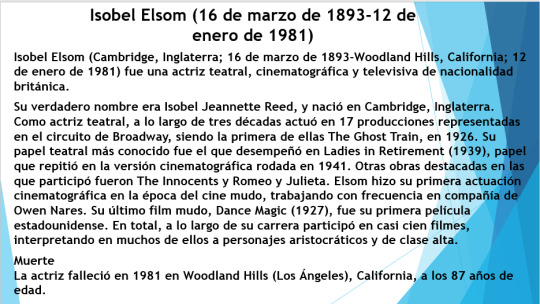
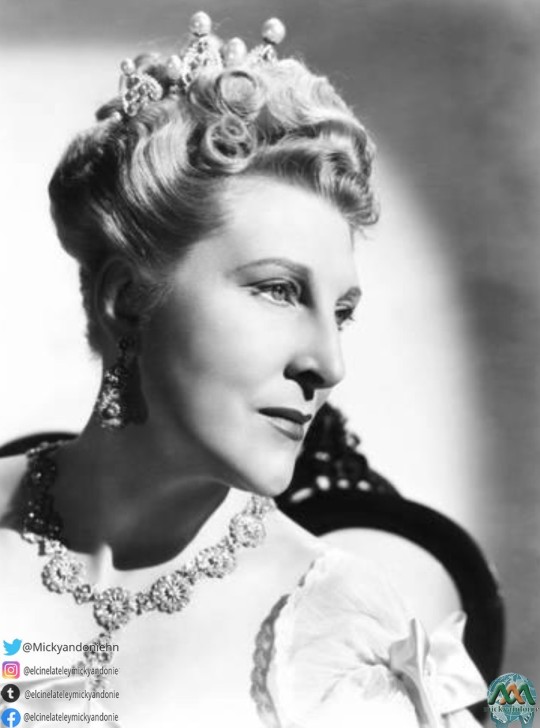
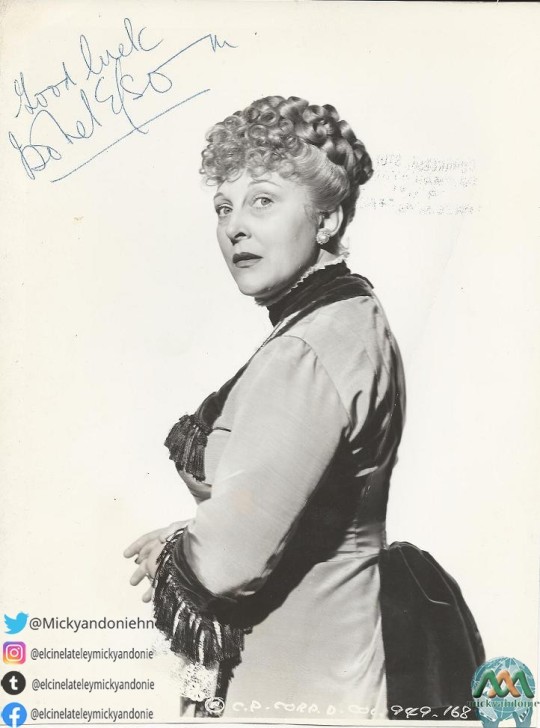
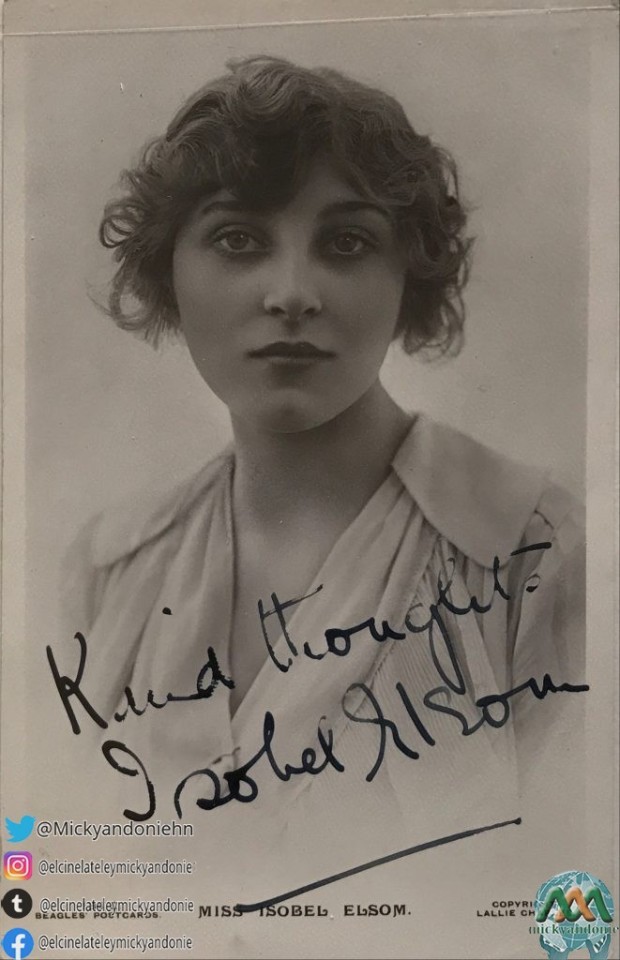
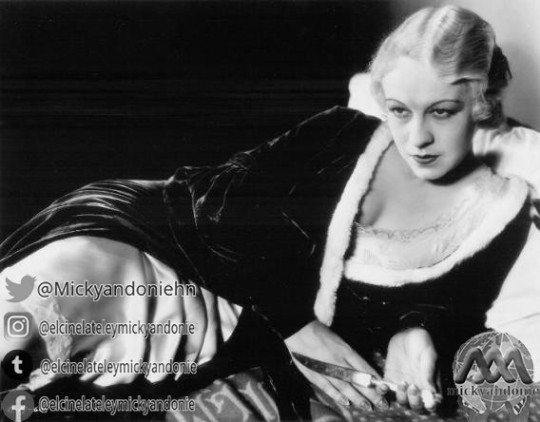

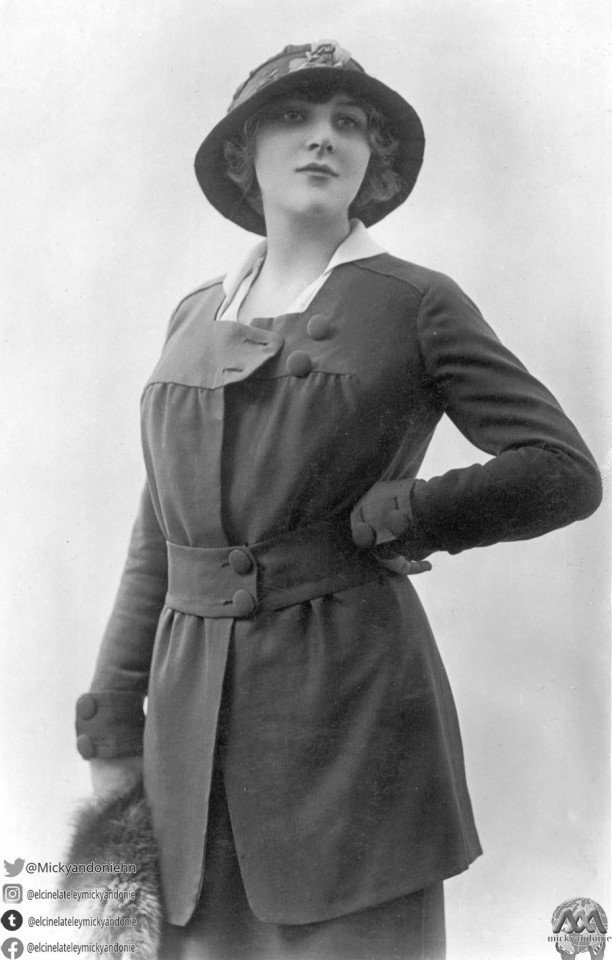
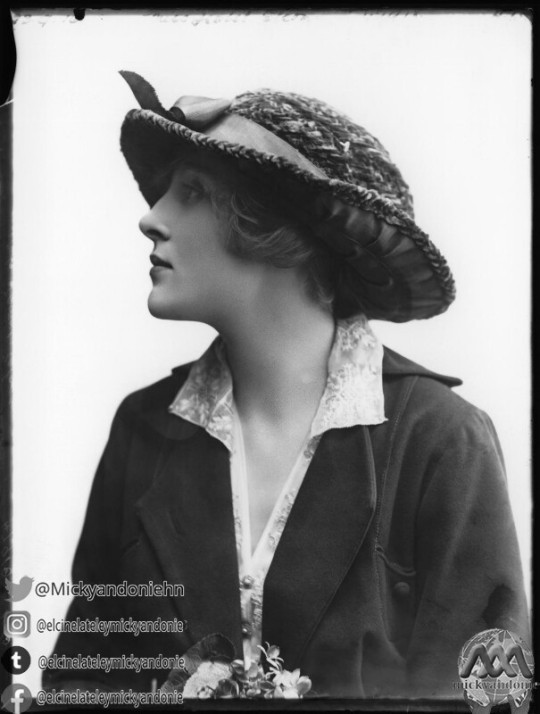
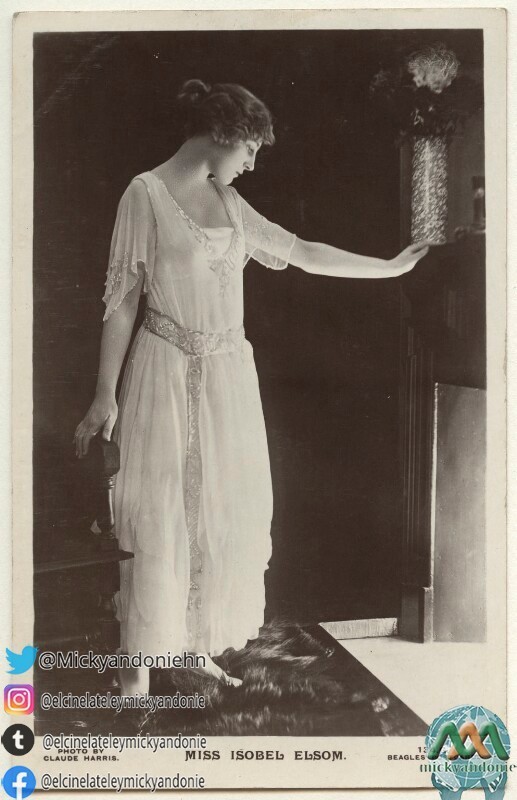
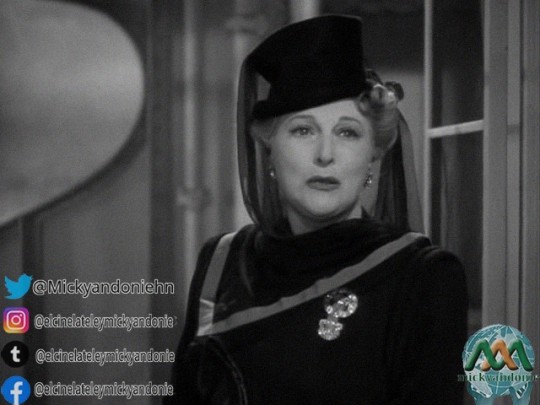
Isobel Elsom.
Filmografía
Teatro
1917-1918 : The Freaks, de Arthur Wing Pinero, con C.V. France y Leslie Howard (Londres)
1920-1921 : Up in Mabel's Room, de Wilson Collison (Londres)
1922-1923 : Sweet Lavender, de Arthur Wing Pinero (Londres)
1923-1924 : The Green Goddess, de William Archer, con George Arliss, Ivan F. Simpson (Londres)
1926 : The Ghost Train, de Arnold Ridley, con Eric Blore, Claudette Colbert
1927 : The Mulberry Bush, de Edward Knoblauch, con Claudette Colbert
1927 : People don't do such Things, de Lyon Mearson y Edgard M. Schoenberg, con Stanley Logan
1928 : The Silver Box, de John Galsworthy, con Mary Forbes
1928 : The Behavior of Mrs. Crane, de Harry Segall, con Walter Connolly y Charles Trowbridge
1928 : The Outsider, de Dorothy Brandon
1938-1939 : American Landscape, de Elmer Rice, con Charles Dingle y Charles Waldron
1940 : Ladies in Retirement, de Reginald Denham y Edward Percy, con Flora Robson
1942 : The Flowers of Virtue, de Marc Connelly, con Frank Craven, Thomas Gomez y Vladimir Sokoloff
1944-1945 : Hand in Glove, de Charles K. Freeman y Gerald Savory, dirección de James Whale
1950 : The Innocents, de William Archibald, con música de Alex North
1950 : The Curious Savage, de John Patrick, con Lillian Gish
1951 : Romeo y Julieta, de William Shakespeare, con Olivia de Havilland y Jack Hawkins
1952 : The Climate of Eden, de Moss Hart
1954m : The Burning Glass, de Charles Langbridge Morgan, con Cedric Hardwicke y Walter Matthau
1957 : Hide and Seek, de Roger McDougall y Stanley Mann, con Barry Morse y Basil Rathbone
1957 : The First Gentleman, de Norman Ginsbury, con Walter Slezak.
Cine
1915 : A Prehistoric Love Story, de Leedham Bantock (corto)
1916 : Milestones, de Thomas Bentley
1918 : The Man who won, de Rex Wilson
1918 : The Way of an Eagle, de G.B. Samuelson
1918 : The Elder Miss Blossom, de Percy Nash
1919 : Hope, de Rex Wilson
1919 : Quinneys, de Maurice Elvey y Herbert Brenon
1920 : Aunt Rachel, de Albert Ward
1921 : For her Father's Sake, de Alexander Butler
1922 : A Debt of Honour, de Maurice Elvey
1922 : The Game of Life, de G.B. Samuelson
1923 : The Harbour Lights, de Tom Terriss
1923 : The Wandering Jew, de Maurice Elvey.
1924 : Who is the Man ?, de Walter Summers
1924 : The Love Story of Aliette Brunton, de Maurice Elvey
1925 : The Last Witness, de Fred Paul
1925 : Le Réveil, de Jacques de Baroncelli
1926 : The Tower of London, de Maurice Elvey
1927 : Tragödie einer Ehe, de Maurice Elvey
1927 : Dance Magic, de Victor Halperin
1931 : The Other Woman, de G.B. Samuelson
1932 : The Crooked Lady, de Leslie S. Hiscott
1933 : The Thirteenth Candle, de John Daumery
1934 : The Primrose Path, de Reginald Denham
1941 : Ladies in Retirement (El misterio de Fiske Manor), de Charles Vidor
1942 : Eagle Squadron, de Arthur Lubin
1942 : Laugh your Blues away, de Charles Barton
1942 : Seven Sweethearts, de Frank Borzage
1942 : You were never Lovelier (Bailando nace el amor), de William A. Seiter
1943 : Forever and a Day (Siempre y un día), de Edmund Goulding y Cedric Hardwicke
1944 : Between two Worlds (Entre dos mundos), de Edward A. Blatt
1944 : Casanova Brown, de Sam Wood
1945 : The Unseen (Misterio en la noche), de Lewis Allen
1946 : Two Sisters from Boston, de Henry Koster
1946 : Of Human Bondage, de Edmund Goulding
1947 : Addio Mimi !, de Carmine Gallone
1947 : The Two Mrs. Carrolls (Las dos señoras Carroll), de Peter Godfrey
1947 : Monsieur Verdoux, de Charlie Chaplin
1947 : El fantasma y la señora Muir, de Joseph L. Mankiewicz
1947 : Ivy, de Sam Wood
1947 : Escape Me Never, de Peter Godfrey y LeRoy Prinz
1947 : The Paradine Case, de Alfred Hitchcock
1948 : Smart Woman, de Edward E. Blatt
1949 : The Secret Garden, de Fred M. Wilcox
1954 : Desirée, de Henry Koster
1954 : Deep in my Heart, de Stanley Donen
1955 : The King's Thief, de Robert Z. Leonard
1955 : La colina del adiós, de Henry King
1956 : Over-exposed, de Lewis Seiler
1956 : 23 Paces to Baker Street (A 23 pasos de Baker Street), de Henry Hathaway
1956 : El loco del pelo rojo, de Vincente Minnelli
1957 : The Guns of Fort Petticoat, de George Marshall
1958 : Rock-a-bye Baby (Yo soy el padre y la madre), de Frank Tashlin
1959 : The Young Philadelphians (La ciudad frente a mi), de Vincent Sherman
1959 : The Miracle (Promesa rota), de Irving Rapper
1960 : The Bellboy, de Jerry Lewis
1961 : The Errand Boy.
1961 : The Second Time Around (Sola ante el peligro), de Vincent Sherman
1963 : Who's minding the Store ? (Lío en los grandes almacenes), de Frank Tashlin
1964 : My Fair Lady, de George Cukor
1964 : The Pleasure Seekers, de Jean Negulesco.
Créditos: Tomado de Wikipedia
https://es.wikipedia.org/wiki/Isobel_Elsom
#HONDURASQUEDATEENCASA
#ELCINELATELEYMICKYANDONIE
11 notes
·
View notes
Photo
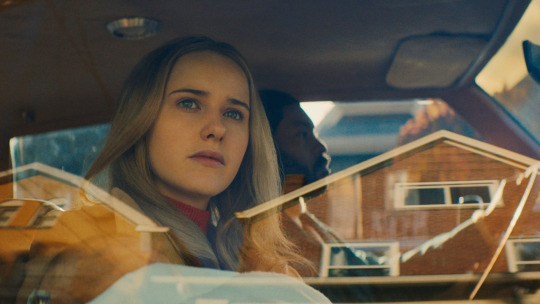
Natural Woman.
Filmmaking power-couple Julia Hart and Jordan Horowitz chat to Jack Moulton about exploring untouched female perspectives in genre films, a fateful viewing of Michael Mann’s Thief, the humbling magic of babies on set, and Letterboxd’s small role in their filmmaking process.
I’m Your Woman puts the gangster’s moll, a classically underwritten character, at the heart of the action. We barely meet the gangster himself in this taut, 1970s-set crime thriller from director Julia Hart and her co-writer and producer husband Jordan Horowitz. Rachel Brosnahan occupies a tense and unusual space as Jean, wife of Eddie, a no-good chap who turns up one day with a very young baby then abruptly disappears, leaving her to raise this unnamed child.
In other versions of the story, we’d follow Eddie to a guns-blazing conclusion, but this is a Hart-Horowitz jam, so we’re quickly on the run with Jean and the baby, and we stay with her. I’m Your Woman is a compelling, unsettling twist on the genre. “What impressed me most … was how well it keeps its cards close to the vest,” writes Mikey on Letterboxd. It’s also an empathetic portrayal of new-motherhood in all its exhausting confusion, where getting a baby clean, fed and sleeping is as much a priority as finding the next safe house. “Despite valuing tension quite highly, Julia Hart still has the wherewithal to let it sit in its more tender and thoughtful moments,” writes Paul. “The ending really sneaks up on you in terms of the specific feeling it elicits.”

Marsha Stephanie Blake and Rachel Brosnahan in ‘I’m Your Woman’.
Hart and Horowitz have children, aged two and six, who have grown up around film sets. Before becoming a filmmaker, Hart spent her days with other people’s kids as a teacher; her 2016 debut, Miss Stevens, stars Lily Rabe as a high-school educator, but her follow-up films have been wider-ranging, from Fast Color to this year’s Stargirl. Hart credits this genre-jumping to her absolute love of movies. “I don’t have a favorite genre. I love musicals, Westerns, crime dramas, coming-of-age movies, superhero movies. It was so fun getting to learn about how to create musical numbers in Stargirl and how to direct a car chase in I’m Your Woman.”
Horowitz, meanwhile, is known for producing The Kids Are All Right and La La Land. Yes, he’s the “Guys, guys, I’m sorry, no, there’s a mistake” guy. Horowitz is also a Letterboxd member, and a hunt back through his diary reveals the date he first watched Moonlight, along with his wholesome reviews of Julia’s films. “I always tried to remember to log my movies in so many different ways,” Horowitz explains, “and then once Letterboxd came out it was a very easy solution.”
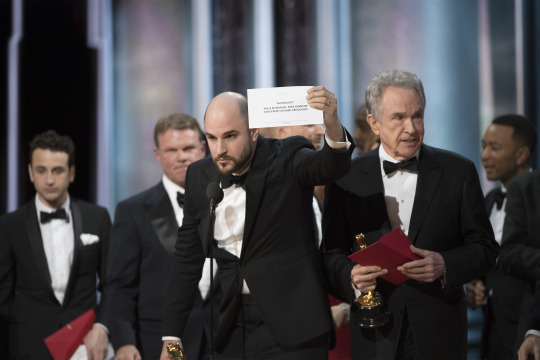
Jordan Horowitz corrects that famous Oscar mix-up.
Horowitz keeps diligent lists of references for his upcoming films, years before they’re even announced. It’s here that the roots of I’m Your Woman are found, if you’re looking closely: a fateful viewing of Michael Mann’s Thief nearly seven years ago was the primary influence on I’m Your Woman, “especially Tuesday Weld’s character, and the moment where she is basically asked to leave the movie before James Caan burns everything to the ground,” he tells me. “Our hope with this movie was to follow some of the women in those movies that don’t necessarily get the spotlight and shift the gaze of the camera to follow this car as it drives away with her in it, instead of staying with the criminal of this movie.”
Hart picks up the thread, naming Diane Keaton in The Godfather, Ali MacGraw in The Getaway, Theresa Russell in Straight Time. “Those were interesting characters played by incredible actresses but they only have a handful of scenes so I loved the idea of exploring a woman in that world and time but telling the story through her perspective.”
Horowitz defines master filmmakers Sidney Lumet, Martin Ritt and Jonathan Demme as Hart’s “spirit animals”, for their humanist takes in multiple genres. A particular recommendation of a Lumet classic from an Amazon executive changed the way they looked at their writing. “Running on Empty has this great scene where they all sing [James Taylor’s] ‘Fire and Rain’ together. Originally in our script, the ‘Natural Woman’ scene was just [Jean] singing. After watching that movie it inspired us to consider what if the Cal character joins in with her? What happens to the moment if it becomes a bit more of a community moment?”

Bill Heck in ‘I’m Your Woman’.
When talking about their writing process, Horowitz admits that he always has his producer hat handy: “I’m never thinking about writing for the sake of writing. I’m always keeping how we make this thing in mind. Do we have too many extras? Is this location gettable? That can help me when we get into production because I’ve already considered some of those things, but I do wish sometimes that I could just sit down as Julia does and just write.” Once the duo makes it into production, Horowitz admits “[I] definitely put writer mode behind me, to the point where we’ll be on set and someone will ask me something about the script and I’ll be like ‘I don’t know, ask Julia’ and they’ll say ‘didn’t you write it too?!’”
However, Horowitz credits Hart as the “idea generator” of the two. The premise to have Jean struggling to connect with her adoptive baby was always part of the conception of the character, largely based on conversations Hart had with mothers, pre-lockdown. “It sometimes feels like Hollywood sees mothers as a monolith where there isn’t much nuance and subtlety, especially when it comes to negative feelings about motherhood, so they’re often shamed into not talking about them,” Julia laments. “It was really important for me to explore a side of motherhood that isn’t talked about as much and make sure that mothers know that they are seen and heard.”
The decision to have a baby (performed by brothers Justin and Jameson Charles) in almost every scene was a big risk, and not one Hart took lightly. “Movie people can think what they’re doing is very important, but there’s nothing more humbling than when you’re on a whole set with hundreds of people [and] you’re waiting for a baby’s dirty diaper to be changed. It made everything feel so real and immediate, so everyone on set really had to live in the moment and adapt. You prepare, and prepare, and prepare, but you have to throw out so much if the baby is sleeping instead of crying, or crying instead of smiling. I think it’s important to portray babies as real people, because as a society we often forget that.”
Lead actress Rachel Brosnahan came on as a producer many years after the script was already in Hart and Horowitz’s heads, but Hart explains that Brosnahan brought a history and interior life, “more in the wordless moments of acting than in dialogue itself.” Along the way, Jean meets Cal and Teri, who guide her to refuge. They’re the heart of the film, and Hart elaborates on their importance to the narrative: “they have been through the hell that Jean is currently going through and her circumstances force them to go through it again, but this time they have honesty, truth and love on their side. In watching Teri and Cal, Jean starts to understand what real love, family and support are.”
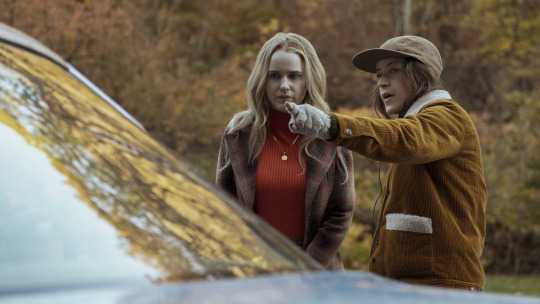
Rachel Brosnahan with director and co-writer Julia Hart.
When you examine Hart’s filmography, it’s impressive how productive she’s been in such a short time, releasing four films within five years, with those pre-schoolers under foot. Horowitz makes a comparison to a prolific filmmaker like Steven Soderbergh, who advises to “fail as fast as you can”. Horowitz acknowledges that “I don’t think we set out like, ‘we’re gonna have two children and we’re gonna make four films in five years.’ If we knew that we were gonna do that we would’ve said, ‘wow, that’s a little bit insane, maybe we shouldn’t do that!’” But they did, and the film world is richer for it.
We always like to ask about the film that made filmmakers want to become filmmakers, and Hart lands on All That Jazz. “I’ve always been a fan of Bob Fosse since his [early] work. How he turned moving your body in a way that people haven’t really moved their bodies before into an empire is very inspiring. [Roy Scheider] is also my favorite actor, which doesn’t hurt. He’s so good.” Horowitz, meanwhile, is a huge fan of Back to the Future. “That was the movie when I was a kid that just opened my eyes to the power of movies, to make you obsess and dream about what other movies could be.”
“I remember going with my parents to see Back to the Future Part II on the Friday night it opened and when we got there it was sold out. We saw some other movie, but I was so upset so all I was thinking about was Back to the Future Part II. As we were leaving the movie theater, I saw through the back little window of the screen where Back to the Future Part II was playing and watched the end scene where Marty is standing in the rain and someone comes and gives him a letter. I did not sleep the entire night. That feeling of anticipation and imagination defines the way I like to look at movies and the way they can make me feel.” A subsequent look at Horowitz’s Letterboxd diary reveals that this conversation perhaps inspired him to take a trip back in time the following day.
Related content
Jordan Horowitz’s list of research for I’m Your Woman
She did THAT!—A list of women who kill
Mothers, Mommy Issues, Moms, Matriarch, Grandmothers
Letterboxd’s Top 200 Crime Films
Disillusionment in Sun-drenched 1970s American New Wave Cinema
Follow Jack on Letterboxd
‘I’m your Woman’ is on Amazon Prime Video now.
#julia hart#jordan horowitz#i'm your woman#rachel brosnahan#crime film#crime thriller#gangster film#gangster's moll#marvelous mrs maisel#directed by women#female director#52 films by women#jack moulton#letterboxd#filmmaking
13 notes
·
View notes